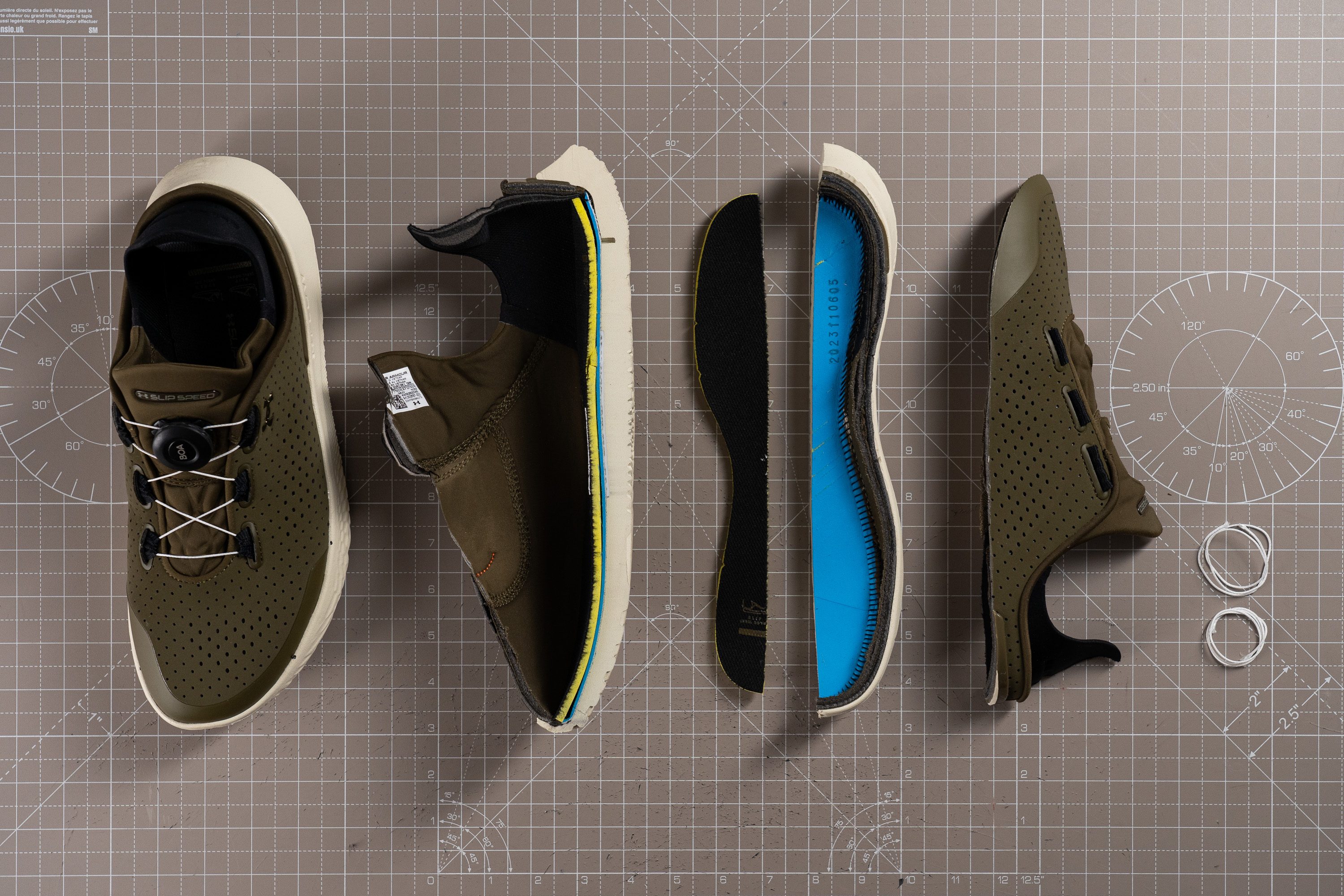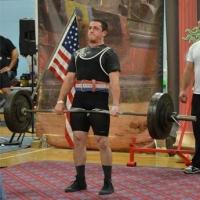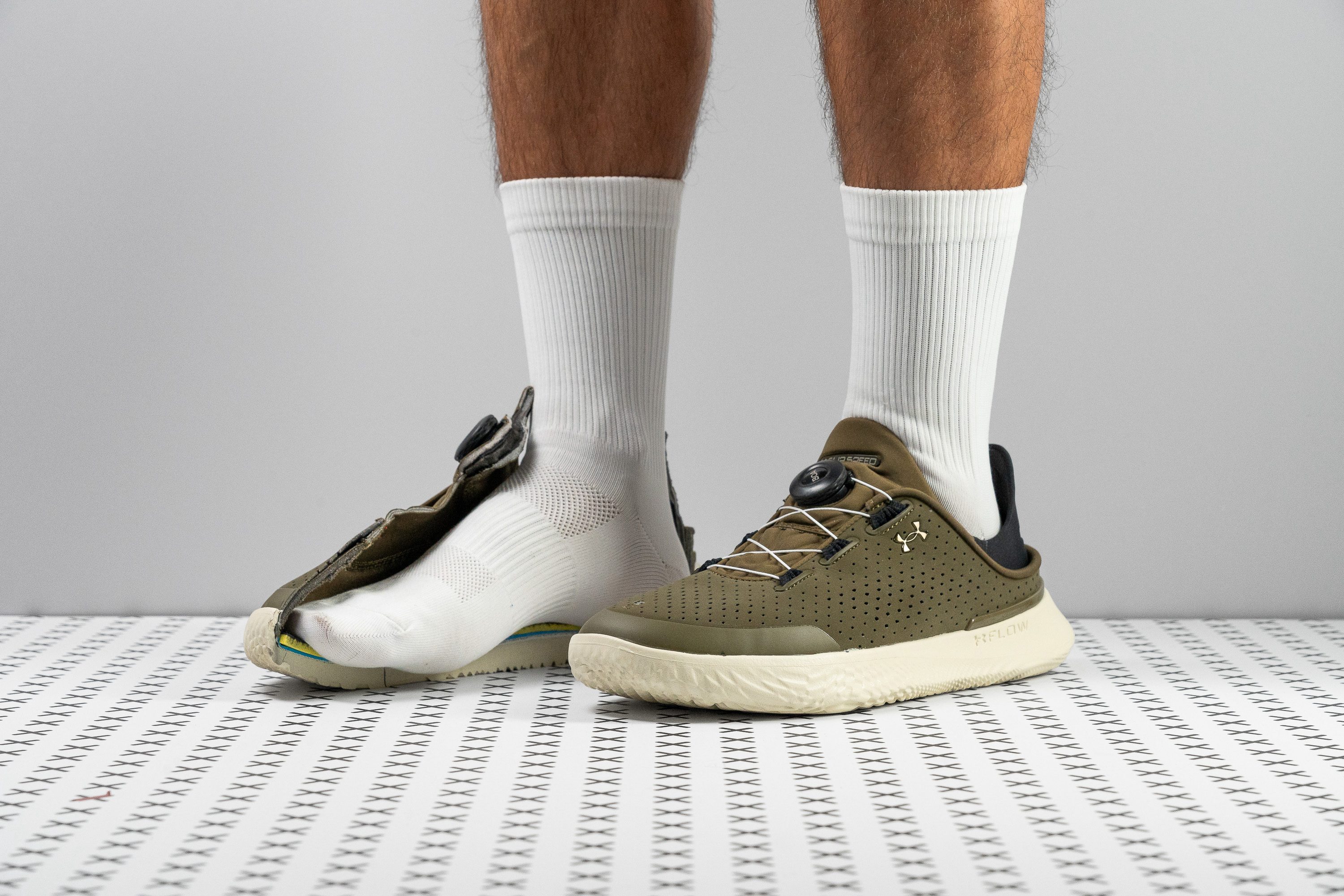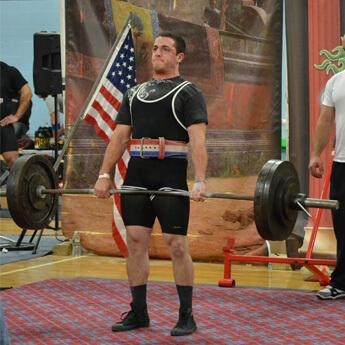Our verdict
Pros
- Highly versatile: from gym to casual wear
- Collapsible heel: shoe to slipper
- Secure and easy-to-adjust BOA lacing
- Hard-wearing upper
- Lighter than average
- Wide and grounded platform
- Comfortable in-shoe feel
- Very flexible profile
- Excellent grip on smooth floors
- Cooling pads regulate in-shoe temperature
- Machine washable
Cons
- Not for intense training and lifting
- Lacks lateral support
- Exposed foam wears fast outdoors
- Very little ventilation
- Upper creases easily
Audience verdict
- Top 22% in training shoes
- Top 22% in lightweight training shoes
- Top 30% most popular training shoes
Comparison
The most similar training shoes compared
+ + Add a shoe | |||||
|---|---|---|---|---|---|
| Audience score | 91 Great! | 71 Bad! | 77 Decent! | 87 Great! | |
| Price | $120 | $120 | $65 | $130 | |
| Use | WorkoutCross-trainingGymHIITJumping rope | WorkoutCross-trainingGymHIITJumping rope | WorkoutCross-trainingGymHIITJumping rope | CrossfitWorkoutCross-trainingGymHIITJumping ropeAll sports | |
| Shock absorption | Moderate | Low | High | - | |
| Energy return | Moderate | Moderate | Moderate | - | |
| Traction | Moderate | Low | Low | - | |
| Drop lab | 1.9 mm | 2.2 mm | 4.5 mm | 4.8 mm | |
| Heel stack lab | 21.1 mm | 14.0 mm | 24.2 mm | 22.3 mm | |
| Forefoot | 19.2 mm | 11.8 mm | 19.7 mm | 17.5 mm | |
| Weight lab | 10.2 oz / 288g | 8.9 oz / 251g | 8.8 oz / 249g | 12.3 oz / 350g | |
| Lightweight | ✓ | ✓ | ✓ | ✗ | |
| Breathability | Warm | Breathable | Breathable | Moderate | |
| Width / fit | Narrow | Narrow | Medium | Narrow | |
| Toebox width | Narrow | Medium | Wide | Medium | |
| Size | Half size small | Half size small | Slightly small | Slightly large | |
| Midsole softness | Balanced | Balanced | Balanced | Balanced | |
| Stiffness | Moderate | Moderate | Moderate | Stiff | |
| Torsional rigidity | Flexible | Flexible | Flexible | Stiff | |
| Heel counter stiffness | Flexible | Flexible | Flexible | Moderate | |
| Toebox durability | Good | Decent | Decent | Good | |
| Heel padding durability | Good | Decent | Bad | Bad | |
| Outsole durability | Bad | Bad | - | Decent | |
| Midsole width - forefoot | Very wide | Average | Average | Average | |
| Midsole width - heel | Wide | Average | Average | Average | |
| Widths available | Normal | NormalWide | Normal | Normal | |
| Insole thickness | Average | Thin | Average | Average | |
| Outsole thickness | Average | Average | Average | ||
| Outsole hardness | Very soft | Average | Average | Average | |
| Heel tab | None | None | None | Finger loop | |
| Tongue: gusset type | Bootie | None | None | None | |
| Tongue padding | Average | Thin | Average | Average | |
| Ranking | #8 Top 22% | #36 Bottom 2% | #33 Bottom 10% | #17 Top 46% | |
| Popularity | #11 Top 30% | #22 Bottom 40% | #15 Top 41% | #27 Bottom 27% |
Who should buy
We believe that the UA SlipSpeed is a gem for people in search of:
- an all-in-one shoe: a home slipper, a gym trainer, a casual sneaker, a practical travel shoe, etc.
- a convertible heel that turns the shoe into a slip-on in a second
- a BOA lacing that is very quick and easy to adjust
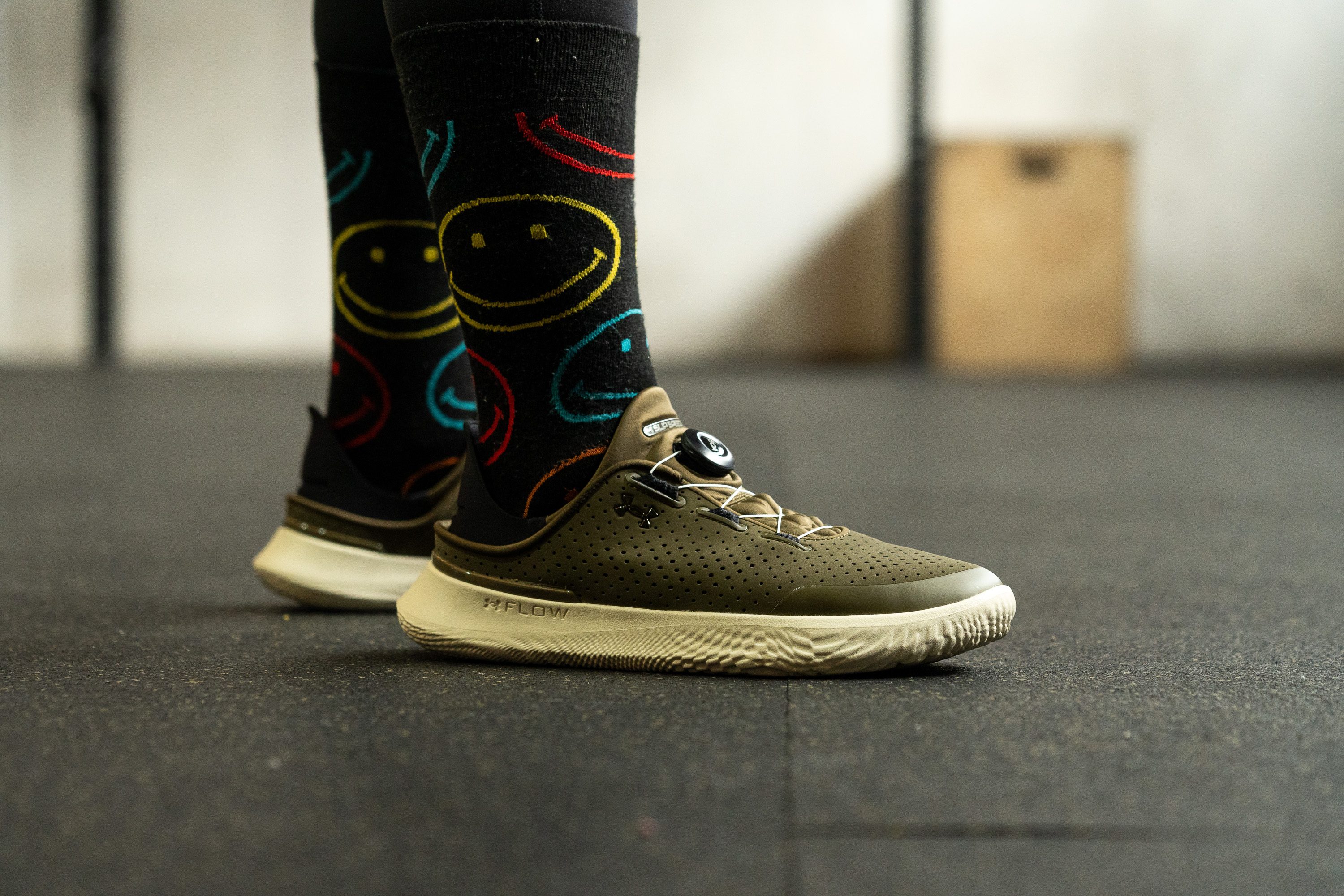
Who should NOT buy
If having a collapsible (drop-in) heel is not a must and you need a full-on training shoe for intense workouts, it is better to skip the SlipSpeed.
When your training regimen calls for the most stable and supportive footwear, we highly recommend the UA TriBase Reign 5.
And if you don't mind other brands, the Nike Metcon 9 and the Reebok Nano X4 are both top-rated trainers.
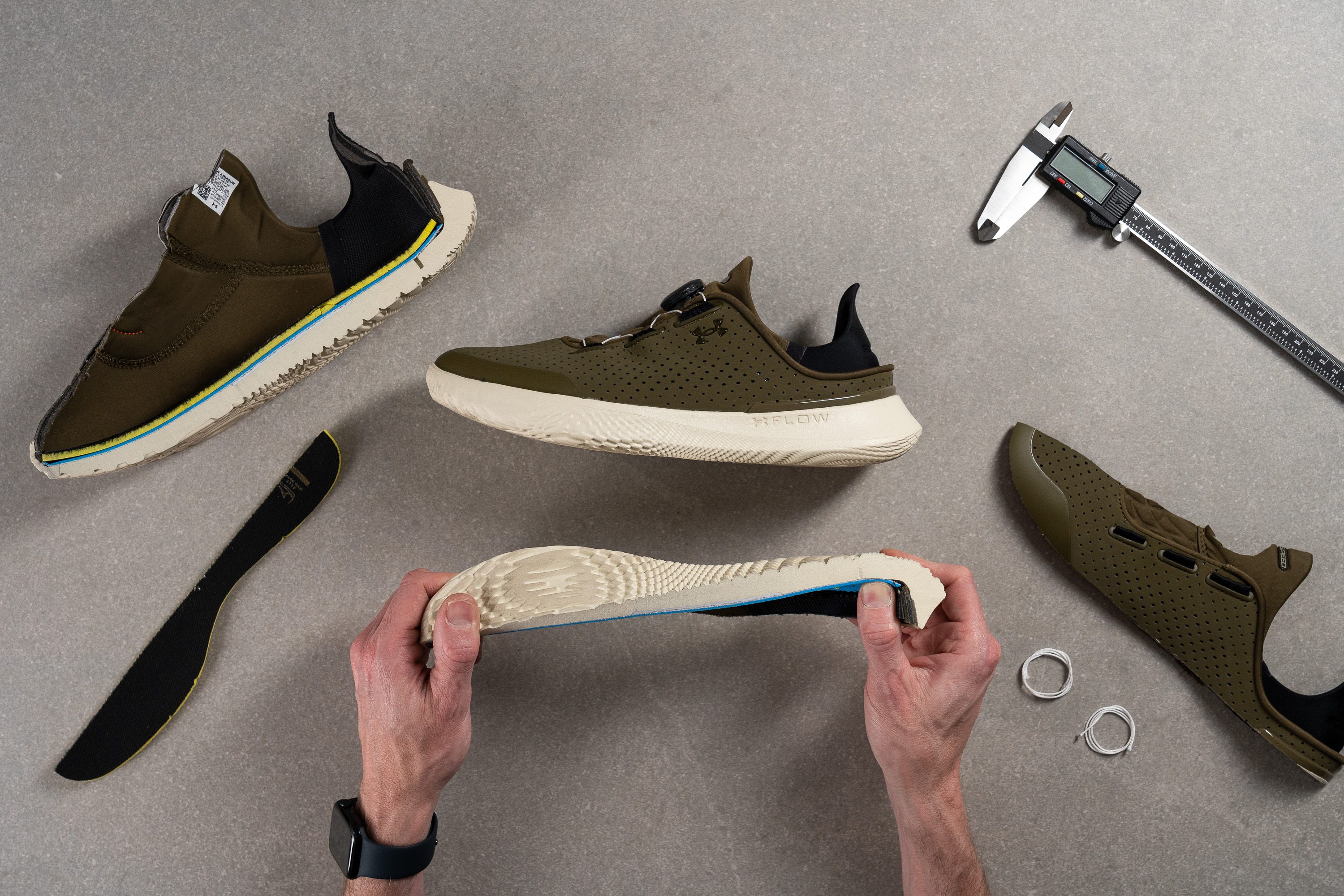
Cushioning
Shock absorption
The UA SlipSpeed feels moderately cushioned and grounded, just like a typical cross-trainer.
With standard shock absorption readings of 85 SA in the heel and 77 SA in the forefoot, it proves to be versatile for both strength training and high-impact exercises.
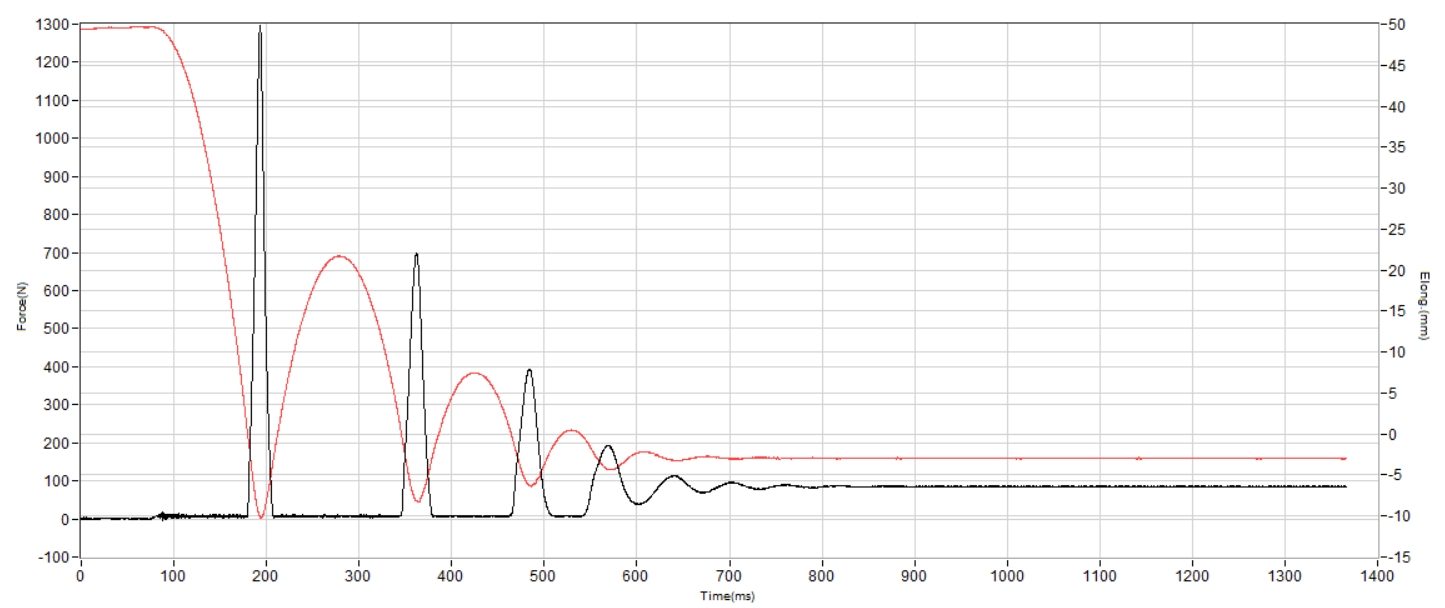
| SlipSpeed | 85 SA |
| Average | 79 SA |
Energy return
Showing a moderate energy return of 50% in both the heel and the forefoot, the SlipSpeed offers just a touch of bounce for short warm-up runs on the treadmill and plyometric exercises.
| SlipSpeed | 50.3% |
| Average | 54.8% |
Heel stack
Measuring its heel stack with a caliper, we got a lower-than-average reading of 21.1 mm. Very similar to the Nike Metcon 9 (21.5 mm).
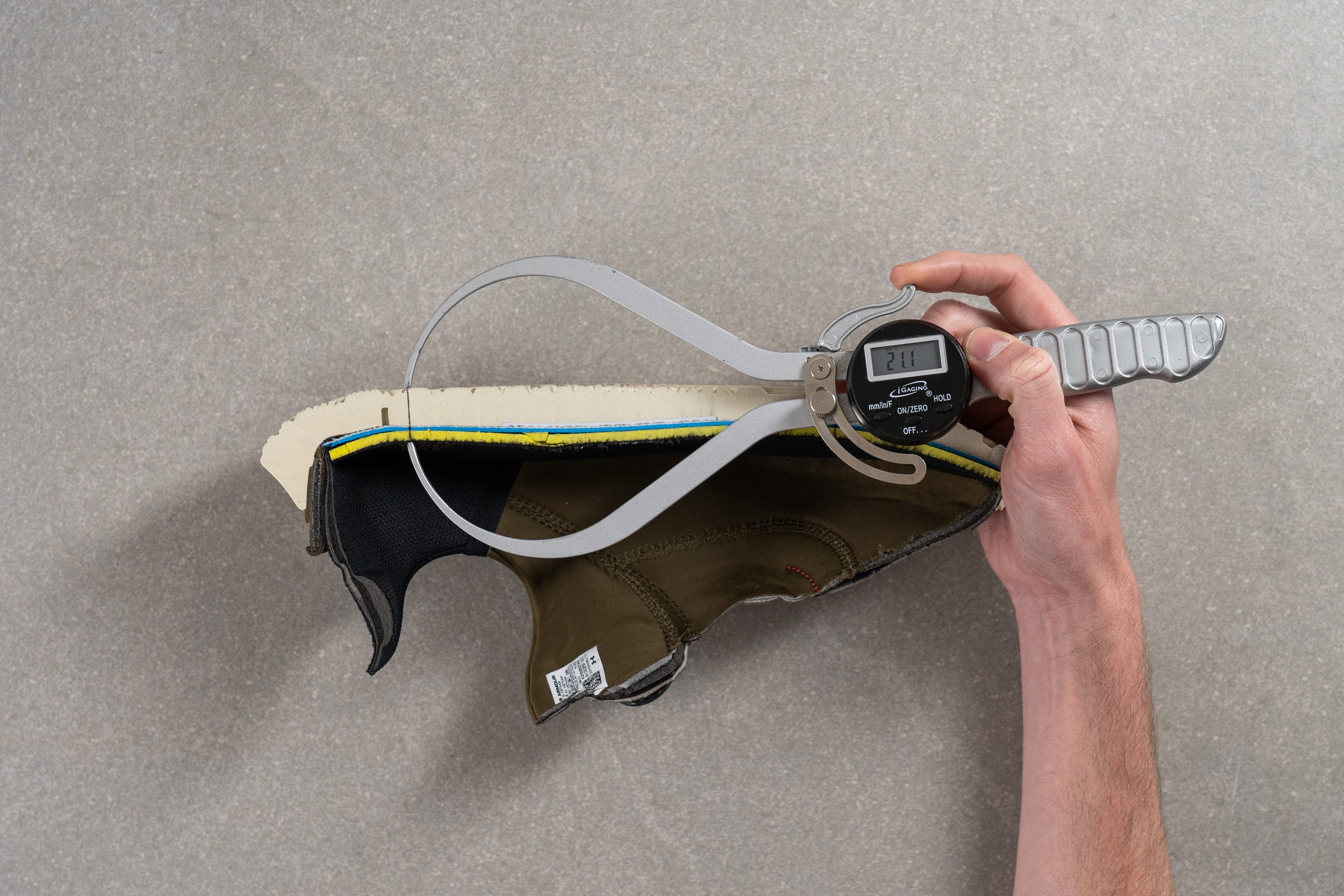
You can expect a sufficient amount of impact protection for walking and jumping sessions but it's not the same as the ultra-plush and cushy running shoes of today.
| SlipSpeed | 21.1 mm |
| Average | 24.3 mm |
Forefoot stack
The forefoot portion of the SlipSpeed also offers more ground feel than cushioning. With a caliper measurement of 19.2 mm, it is just the same as the average cross-trainer.
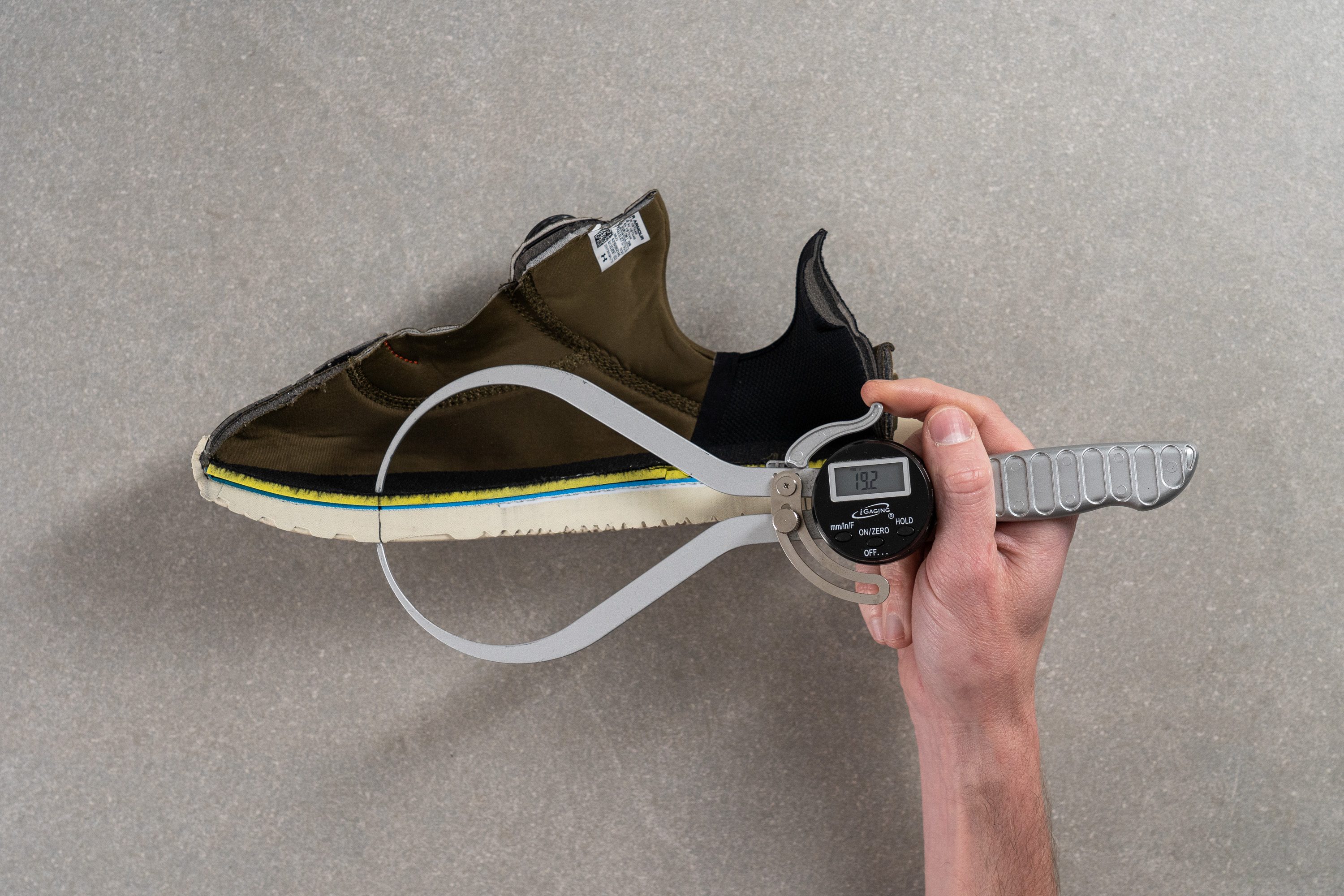
We found that it hits a sweet spot between shock absorption and ground feedback. Both rope jumps and lifting felt at home in this trainer.
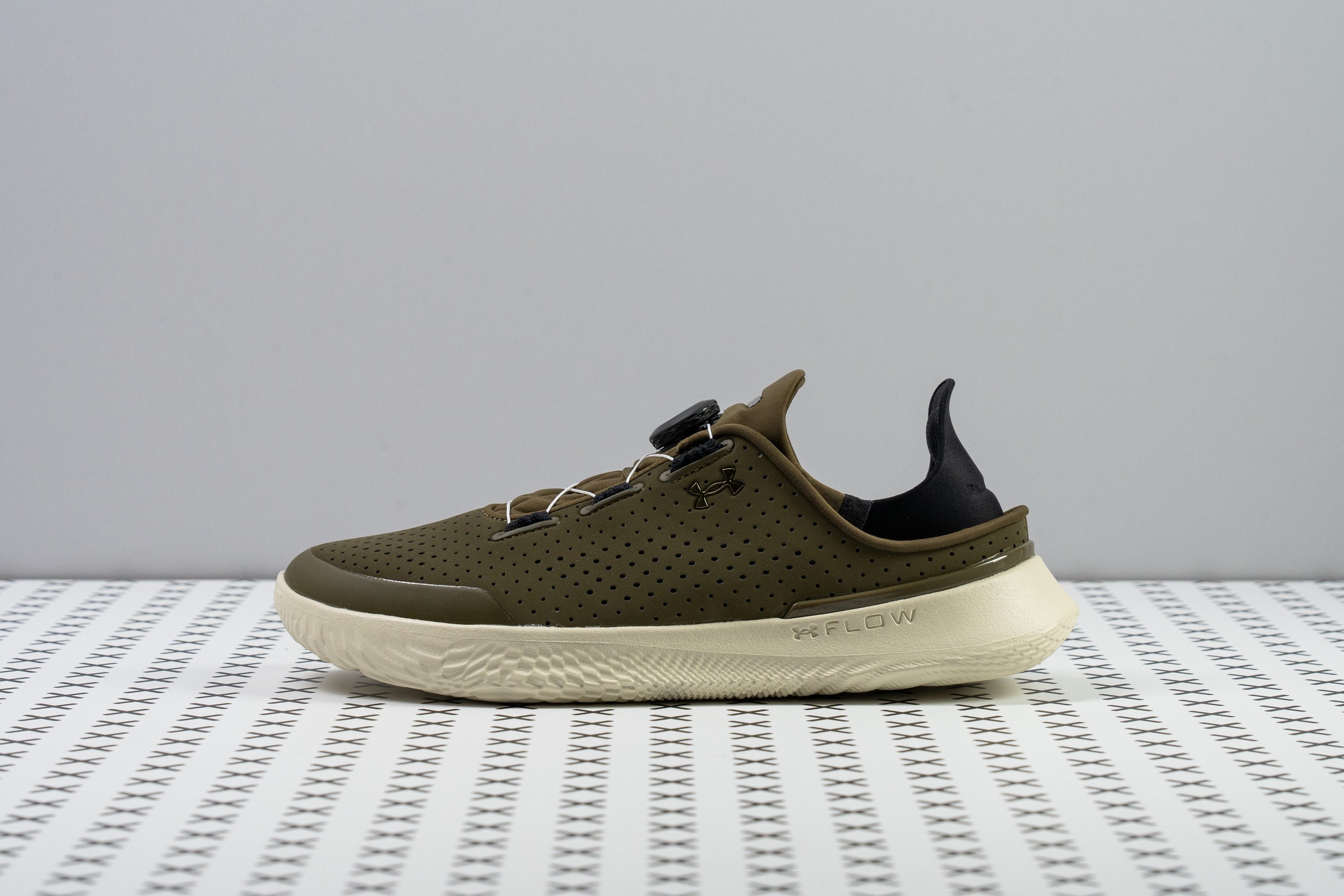
| SlipSpeed | 19.2 mm |
| Average | 18.1 mm |
Drop
We thoroughly enjoyed a sense of underfoot control in the UA SlipSpeed.
There is practically no heel elevation in the shoe due to the very minimal heel-to-toe drop (1.9 mm). It means that the heel is almost at the same level as the toes (as if you were standing barefoot on the floor).
It helped us feel more planted and activated the Achilles tendon more than usual. So, if you struggle with ankle mobility, particularly during deep squats, we advise going with a higher-drop shoe (at least 6 mm).
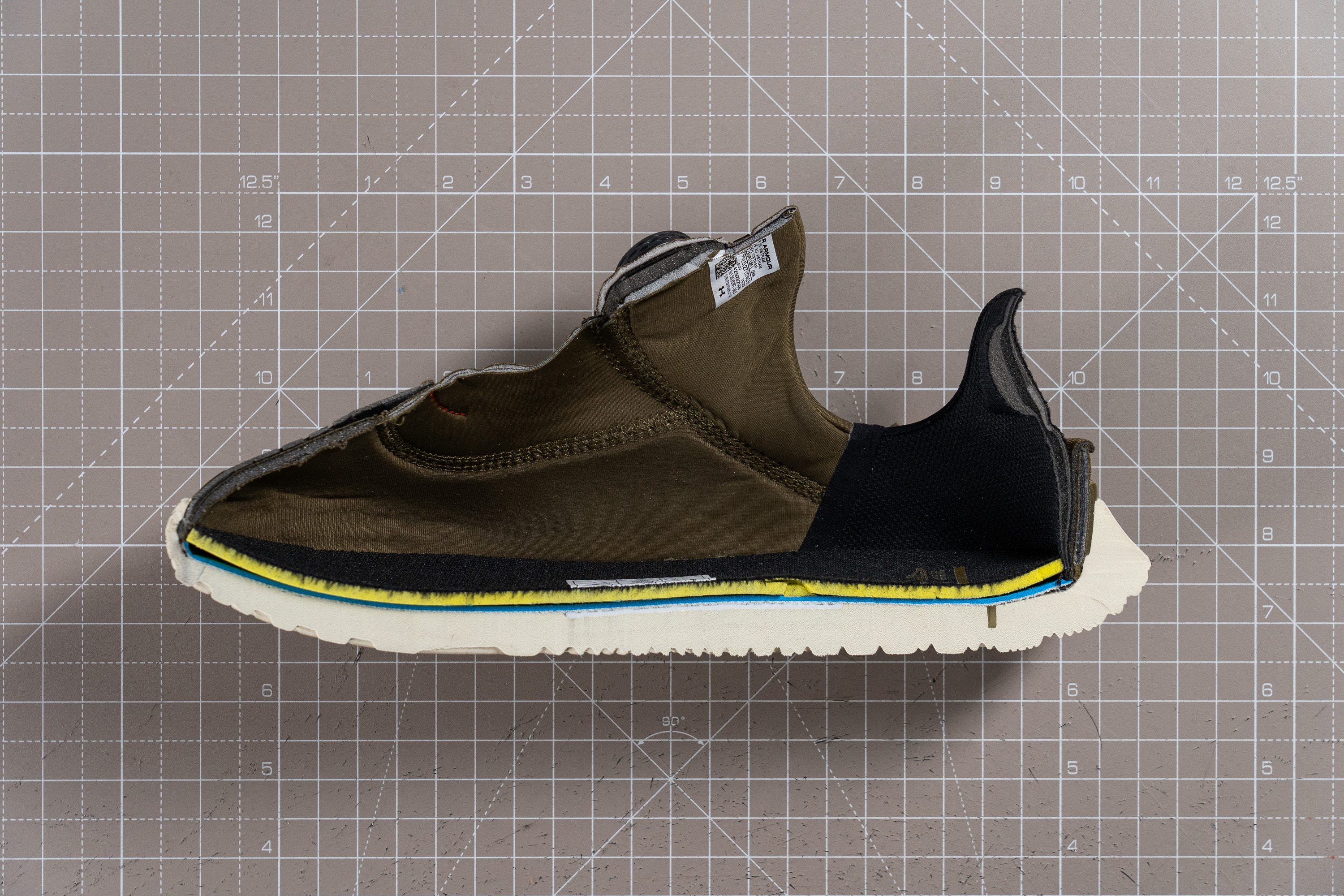
| SlipSpeed | 1.9 mm |
| Average | 6.3 mm |
Midsole softness
If you are familiar with Under Armour's basketball shoes or running footwear, you will be pleased to see the brand's Flow cushioning foam in the SlipSpeed.
But don't expect the same softness in this trainer. Pressing our durometer against the shoe's Flow midsole returned 28.5 HA which is slightly firmer than average.
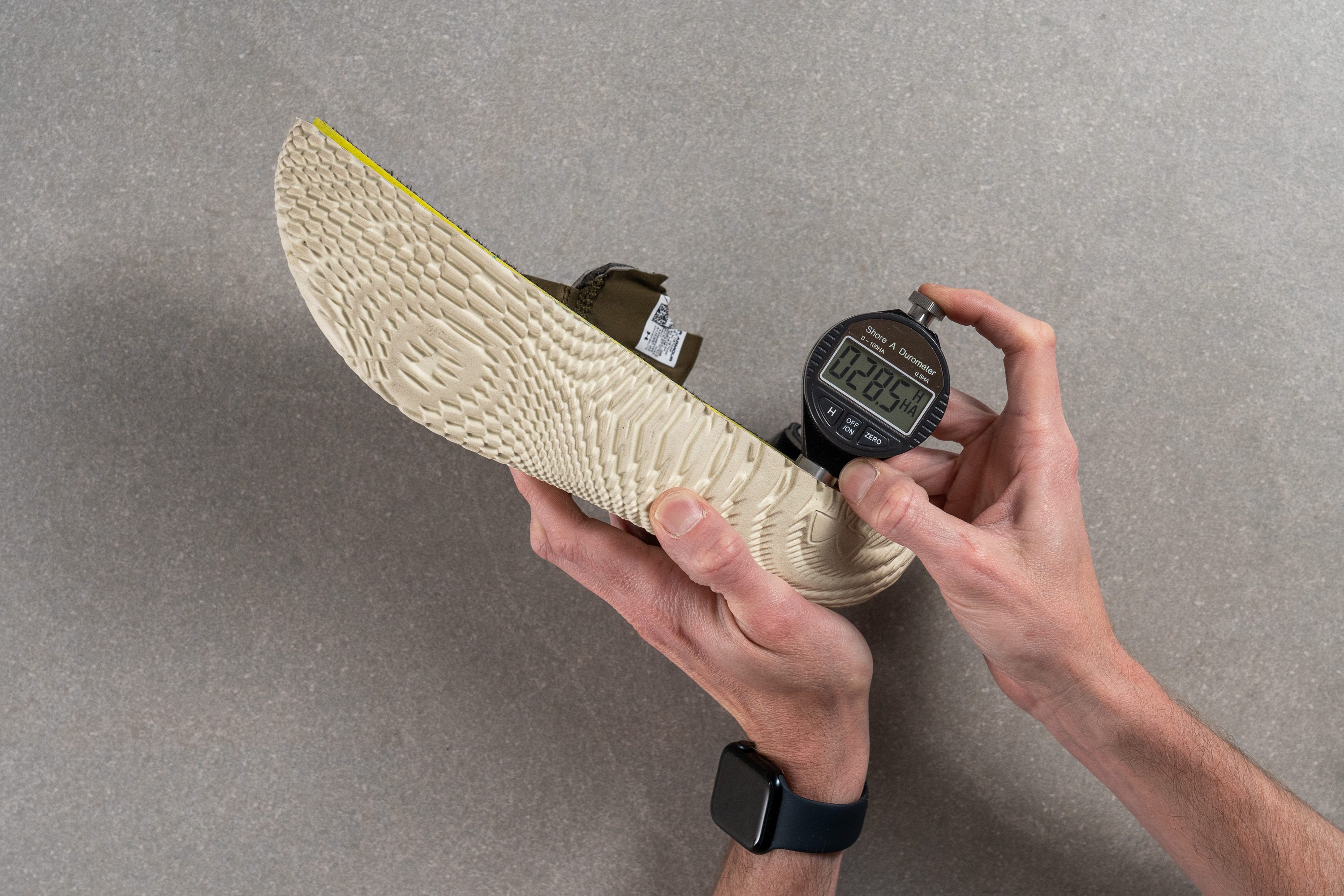
| SlipSpeed | 28.5 HA |
| Average | 27.8 HA |
Size and fit
Size
Under Armour SlipSpeed fits half size small (20 votes).
Consider sizing up
Internal length
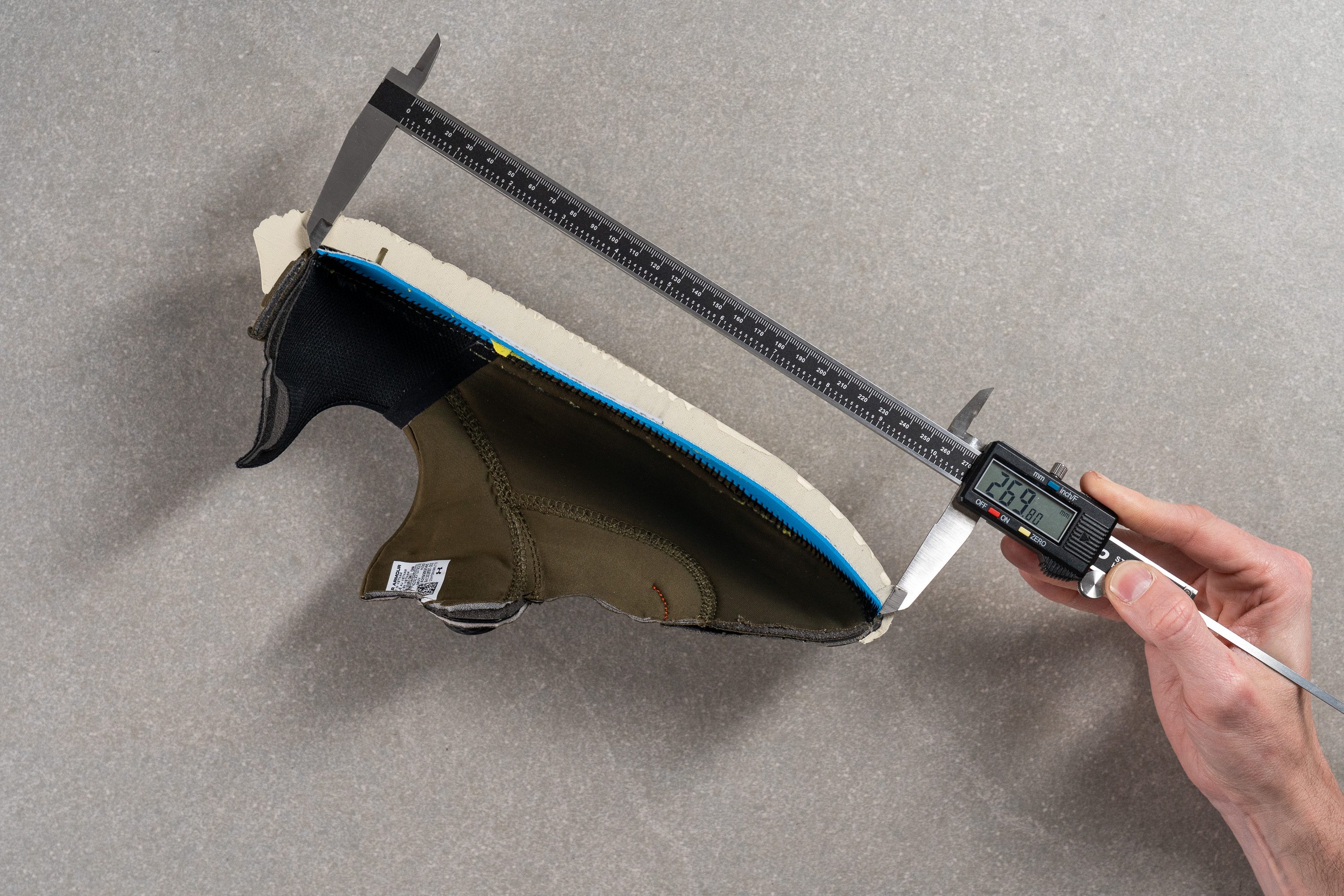
| SlipSpeed | 269.8 mm |
| Average | 268.9 mm |
Width / Fit
The moment we slipped into the SlipSpeed, we could feel its snug one-to-one fit. And the fact that its synthetic upper is thick and has no stretch at all contributes to the skin-tight experience.
But now let's pour some gel into the shoe to figure out how snug we're talking...
As soon as the mold was ready, we measured its widest part with a caliper. The measurement confirmed our impressions, showing only 93.3 mm in the metatarsal area.
We think that athletes with medium-to-narrow feet will appreciate this UA trainer, unlike the wide-footed folks, especially since there is no wide version available.
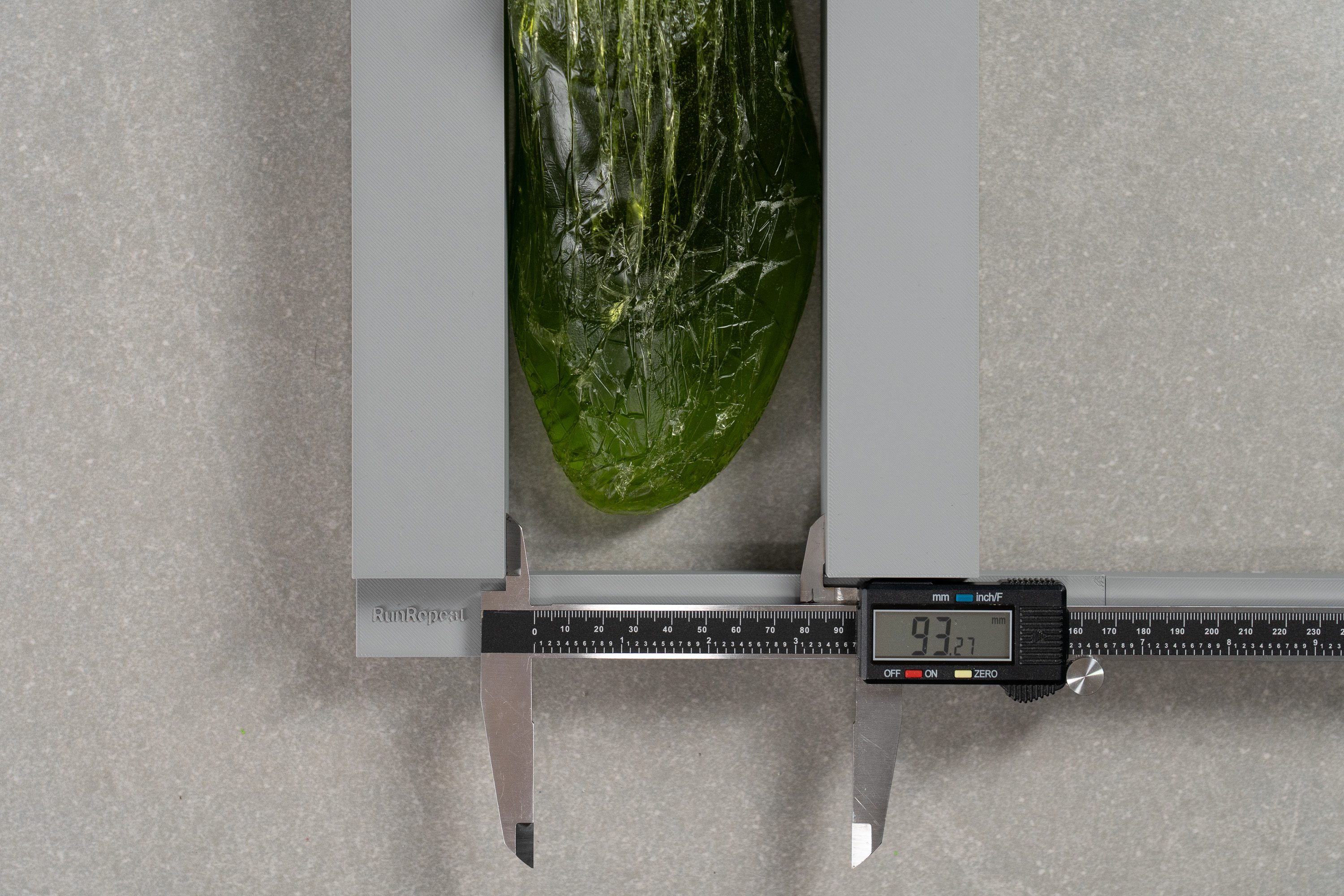
| SlipSpeed | 93.3 mm |
| Average | 96.6 mm |
Toebox width
It is also important to mention that the SlipSpeed's toebox gets progressively narrow towards the front.
Measuring the mold's width in the big toe area returned as little as 65.1 mm! This is a very rare case of sub-70 mm in the training shoe category.
On a lighter note, a close fit like that guarantees that this slip-on trainer won't go flying off your foot in the middle of the workout. It remains surprisingly secure during intense movements.
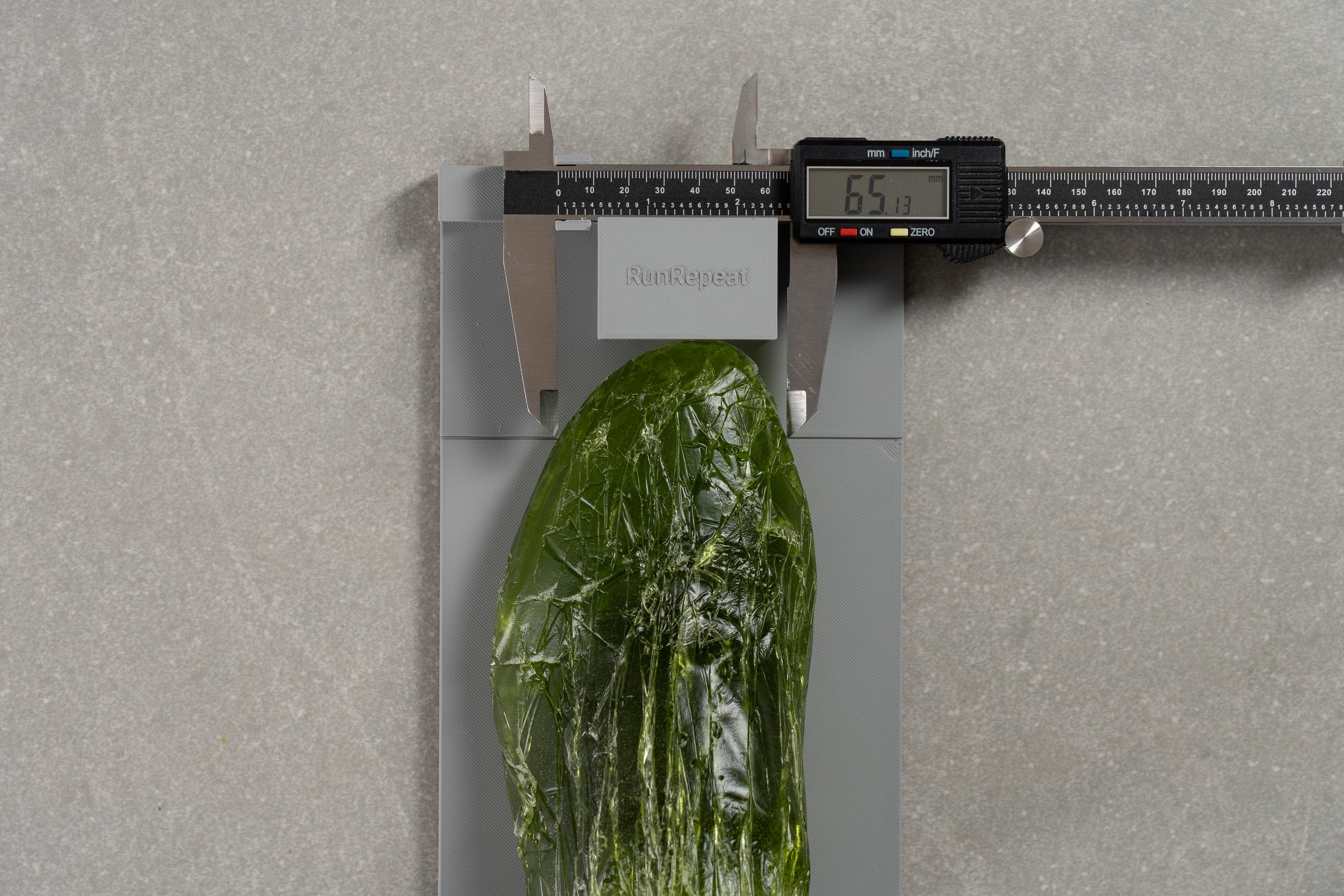
| SlipSpeed | 65.1 mm |
| Average | 73.5 mm |
Toebox height
The SlipSpeed trainer also locks the toes pretty firmly from the top. A very minimal vertical space of 24.2 mm contributes to the shoe's overall snugness.
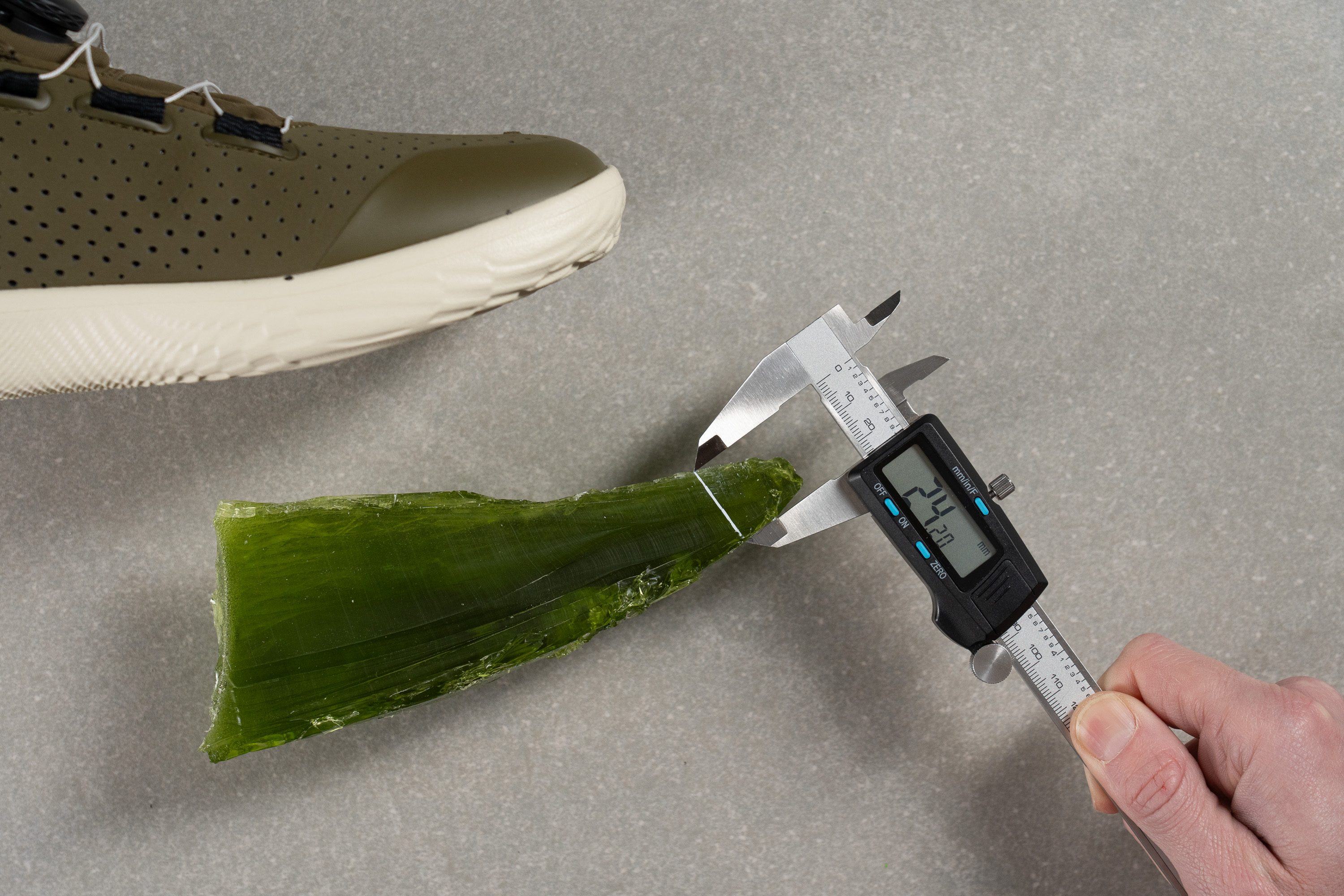
| SlipSpeed | 24.2 mm |
| Average | 27.1 mm |
BOA lacing
Working together with the bootie, the BOA closure provides a highly secure lockdown in the midfoot.
This toggle lacing system takes seconds to adjust and can be regulated with just one hand, on-the-go. The knob turns in 1-mm increments allowing us to fine-tune the fit. To release the hold, all we needed to do was to pull the knob up.
If you feel uncertain about the ultra-thin cables, there is no reason to be concerned. These strings are made of the strongest man-made fiber in the world which is also used for laying cable at the bottom of the ocean. And it has long proven itself on snowboarding boots to.
Traction / Grip
Traction test
Granted, the SlipSpeed's exposed foam undercuts many rubber outsoles when it comes to grip.
Softer and toothier, the Flow foam returned a great friction score of 0.34 in our forefoot traction test. It bites onto smooth rubber and hardwood gym floors like there is no tomorrow. With its lugs facing all fronts, we found it easy to stop on a dime and change directions on the fly.
| SlipSpeed | 0.34 |
| Average | 0.33 |
Outsole design
The UA SlipSpeed's outsole design is one of the most unique ones we've seen in training shoes! Its intricate texture makes it look like it's been 3D-printed for the most fine-tuned experience.
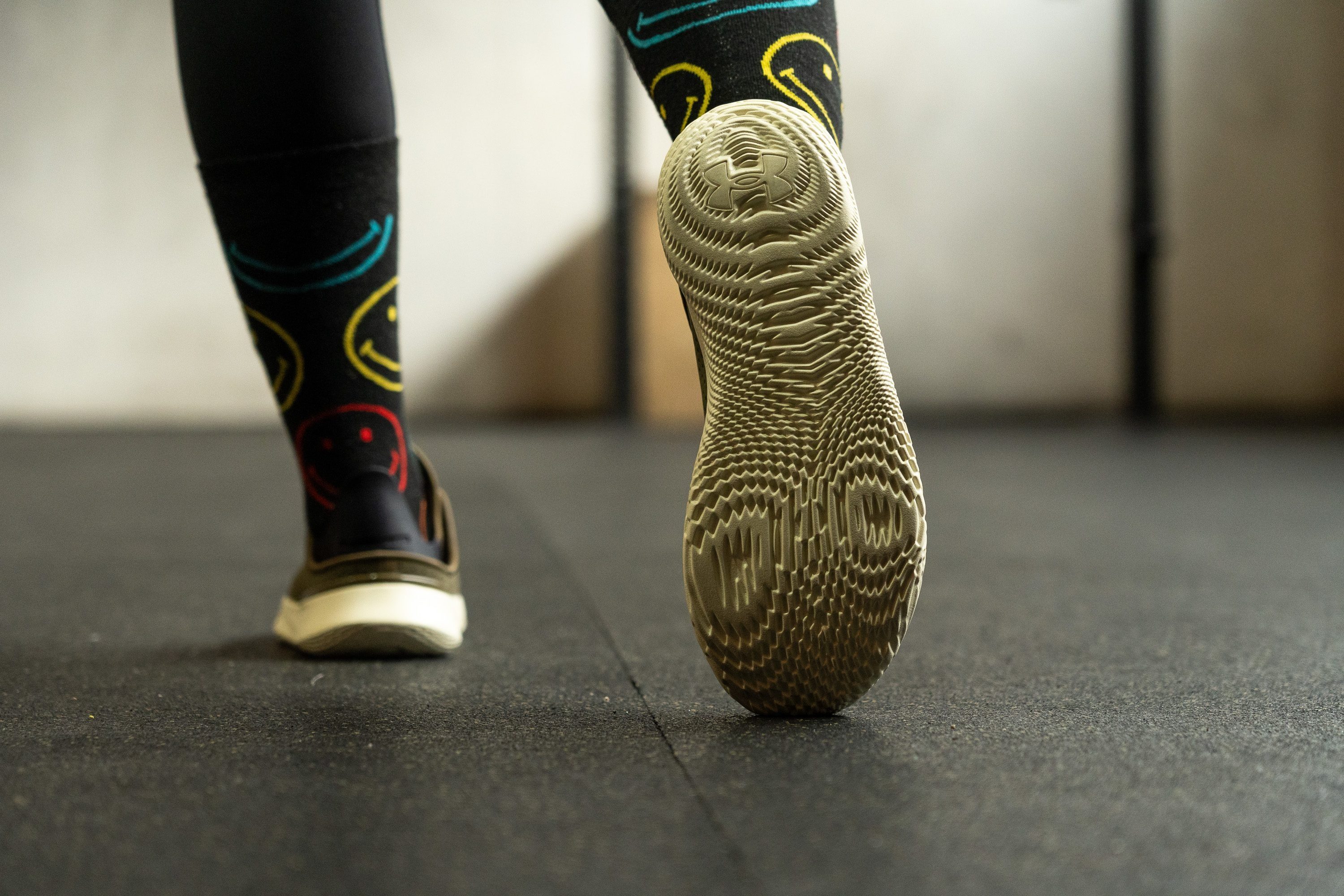
Flexibility / Stiffness
You can rest assured that the UA SlipSpeed bends enough to let you perform lunges, hold a plank, and walk around comfortably.
According to our shoe flexing tester, it only takes 9.9N of force to bend this shoe to a 30-degree angle. This is a little less than it takes an average training shoe.
On the flip side, a more flexible profile makes it trickier to lift heavy as we found it harder to ground toes on the floor.
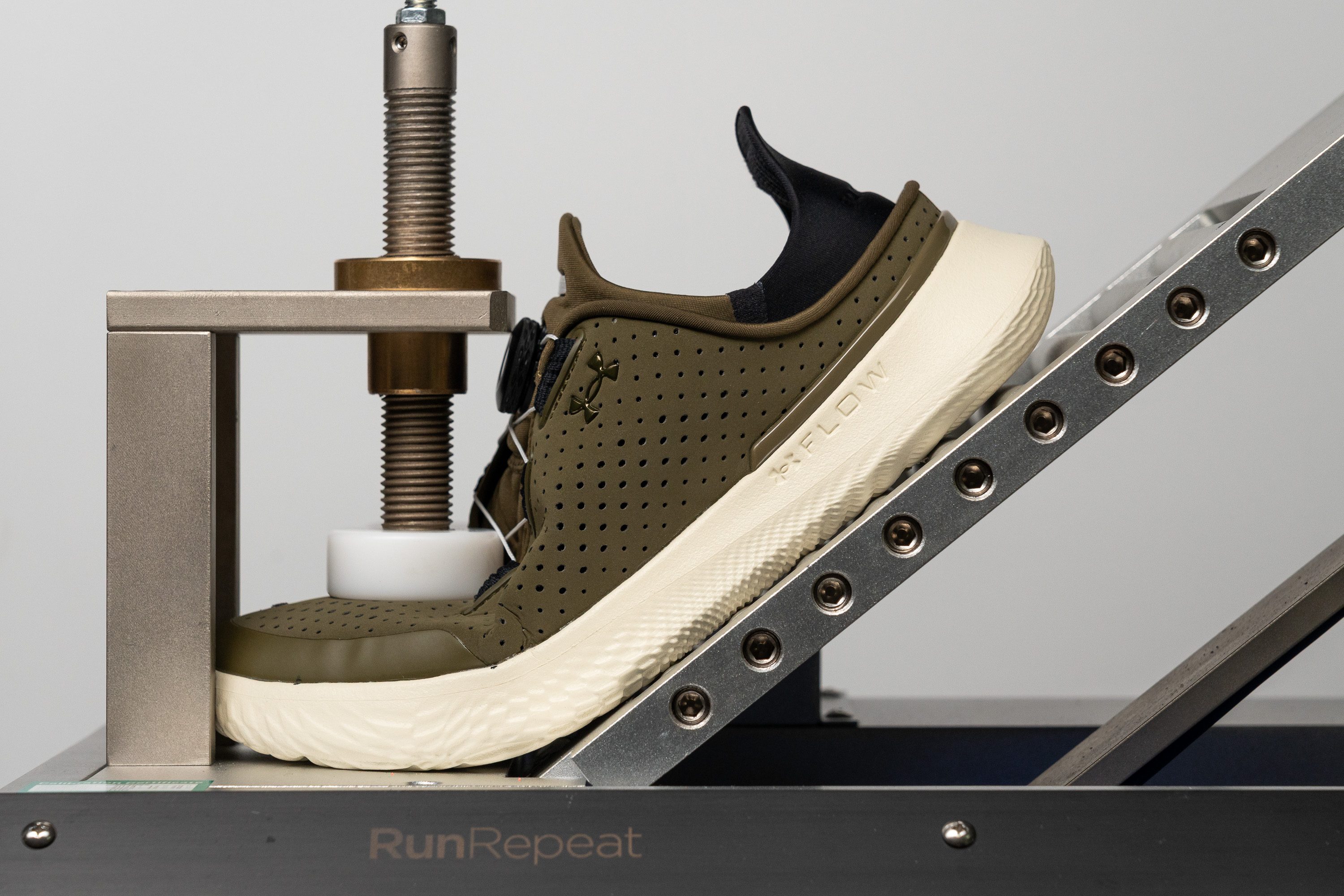
| SlipSpeed | 9.9N |
| Average | 10.2N |
Weight
The absence of a rubber outsole really helps the SlipSpeed to minimize the bulk.
Weighing it in a men's US size 9, we got a below-average measurement of 10.2 oz (288g). Nice and light!
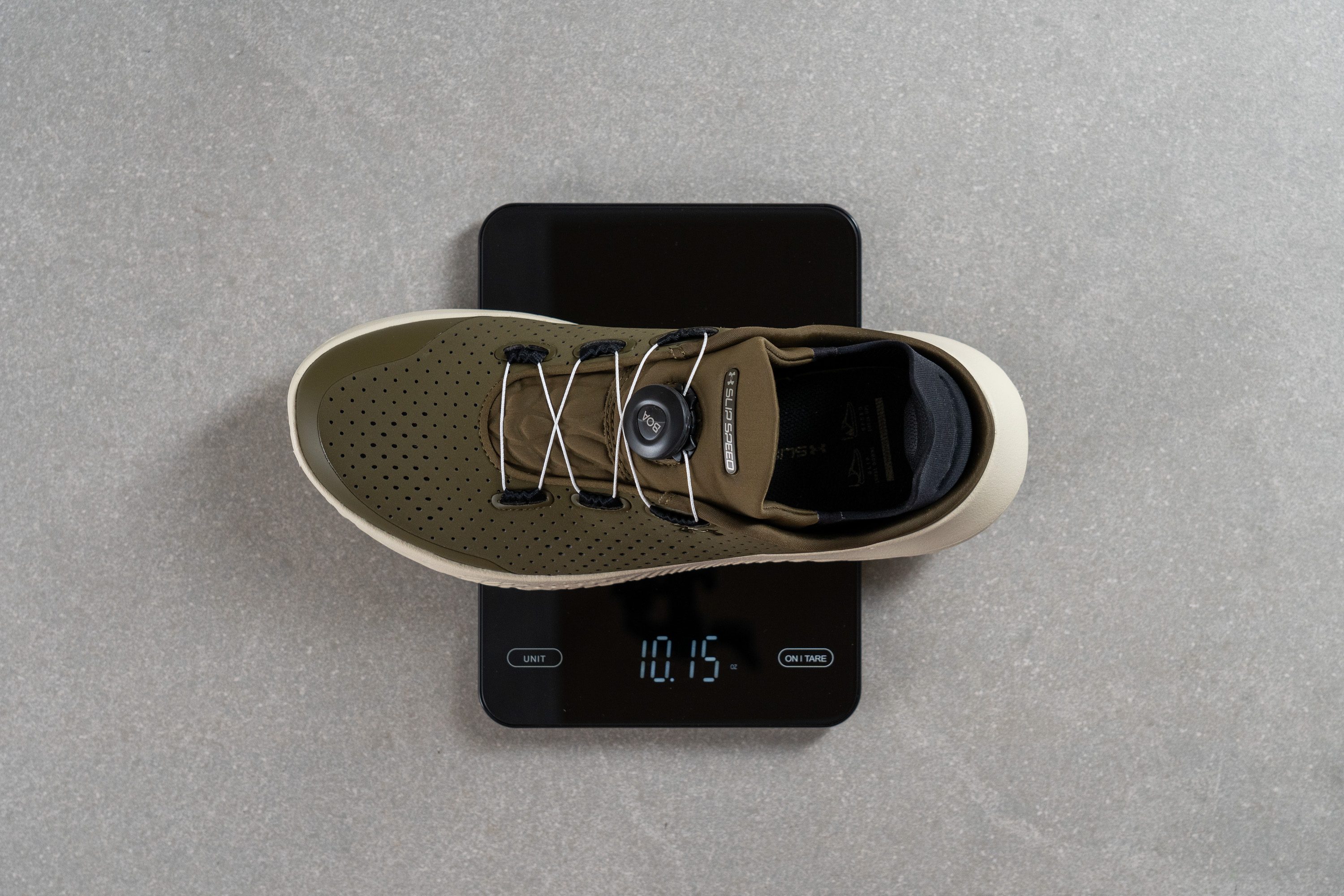
On foot, this Under Armour shoe feels like an actual slipper! It got us through the gym session and then the rest of the day without a hint of foot-dragging.
| SlipSpeed | 10.2 oz (288g) |
| Average | 10.7 oz (304g) |
Breathability
With its neoprene-ish inner bootie and thick synthetic outer shell, the SlipSpeed doesn't let much air in or out.
As you can see in our breathability test above, the shoe's upper barely allows the smoke to escape the interiors.
And even when we tried hovering its half-cut upper over the light, no secret ventilation holes showed up.
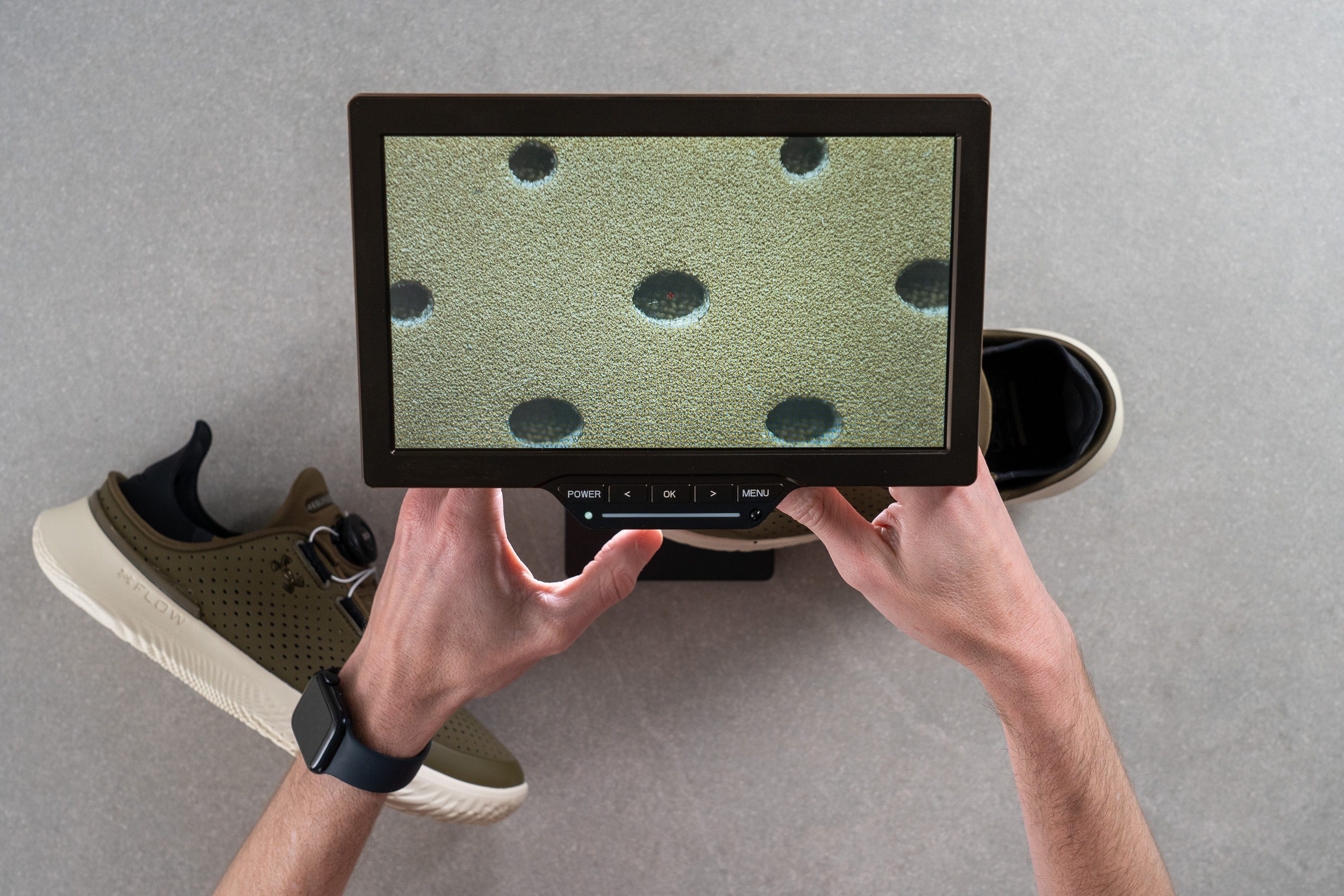
Sure, the shoe's upper is full of perforations. But the reinforced padding beneath it simply doesn't let them work full time.
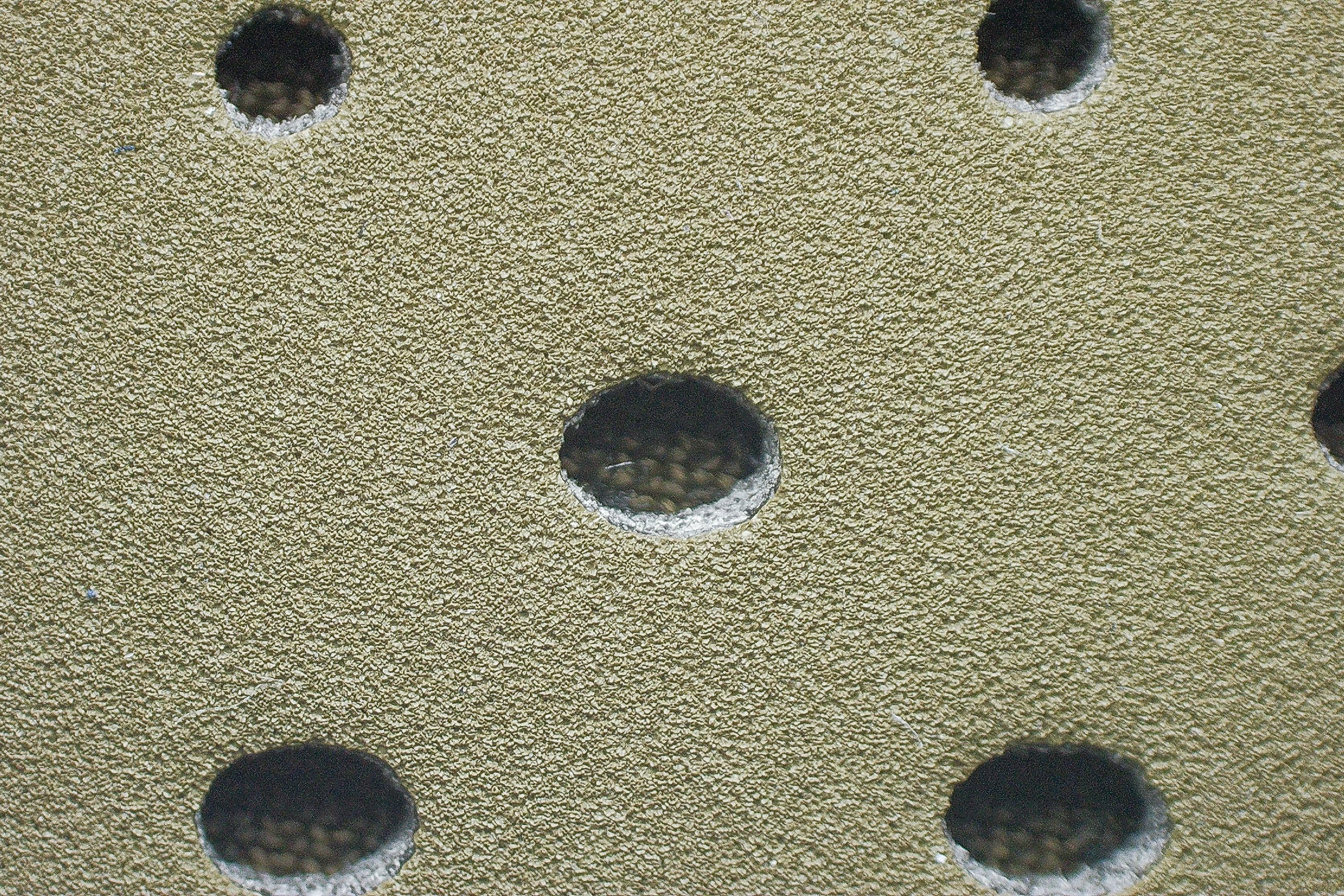
So, let's get this straight - the SlipSpeed is NOT a breathable trainer. If we compare it to other training shoes on a 1-5 breathability scale, this UA shoe deserves no more than a 2. But then how did it manage to keep our feet cool?
The answer is Iso-Chill padding throughout the inner lining and on the tongue. These cooling pillows did a great job of regulating the temperature inside the SlipSpeed and prevented our feet from heating up in the first place!
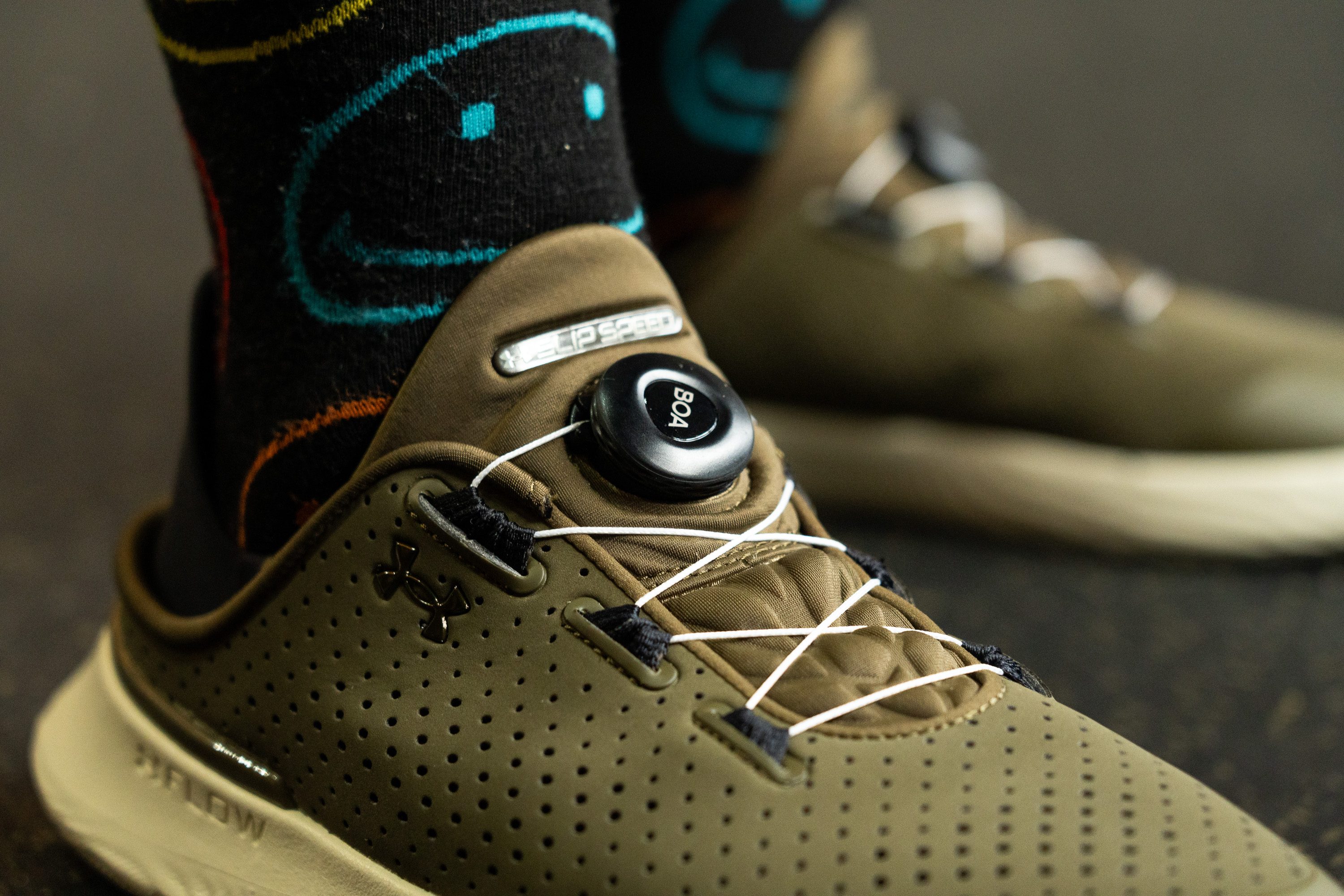
This is the first time we ever see something like this on a shoe, albeit a training shoe!
| SlipSpeed | 2 |
| Average | 3.6 |
Stability
Lateral stability test
Generally, the SlipSpeed offers a solid footing with its low-to-the-ground, firm, and wide sole. But the shoe fails miserably when it comes to lateral support and containment.
Where most cross-trainers feature solid TPU reinforcements, the SlipSpeed doesn't have any supportive elements.
If your workouts involve a lot of heavy lifting and forceful lateral movements, or if you deal with overpronation (excessive inward rolling of the foot), you must get a more supportive trainer. We recommend looking towards the Reebok Nano X4 and the Nike Metcon 9.
Torsional rigidity
You can clearly see how little structure there is to the UA SlipSpeed as we twist it effortlessly with our hands.
On a scale from 1 to 5, where 5 is the stiffest, we rated this trainer with the lowest score of 1. It is much more pliable than the average training shoe.
| SlipSpeed | 1 |
| Average | 2.9 |
Heel counter stiffness
It is pretty obvious that the shoe's convertible heel offers pretty much no heel hold.
It is a completely different design from a typical cross-trainer. You have to choose between having a firm heel hold and the option to swap between a slip-on and a shoe.
Once again, we advise going for a full-on supportive shoe if you have fallen arches or moderate/severe overpronation.
| SlipSpeed | 1 |
| Average | 2.7 |
Midsole width - forefoot
Looks like the SlipSpeed mostly relies on its wide base for stability.
Notably wider than average, the shoe's platform creates extended contact points with the floor to give a better sense of control.
Measuring the widest part of the sole in the forefoot, our caliper showed 117.3 mm which is over 7 mm wider than average!
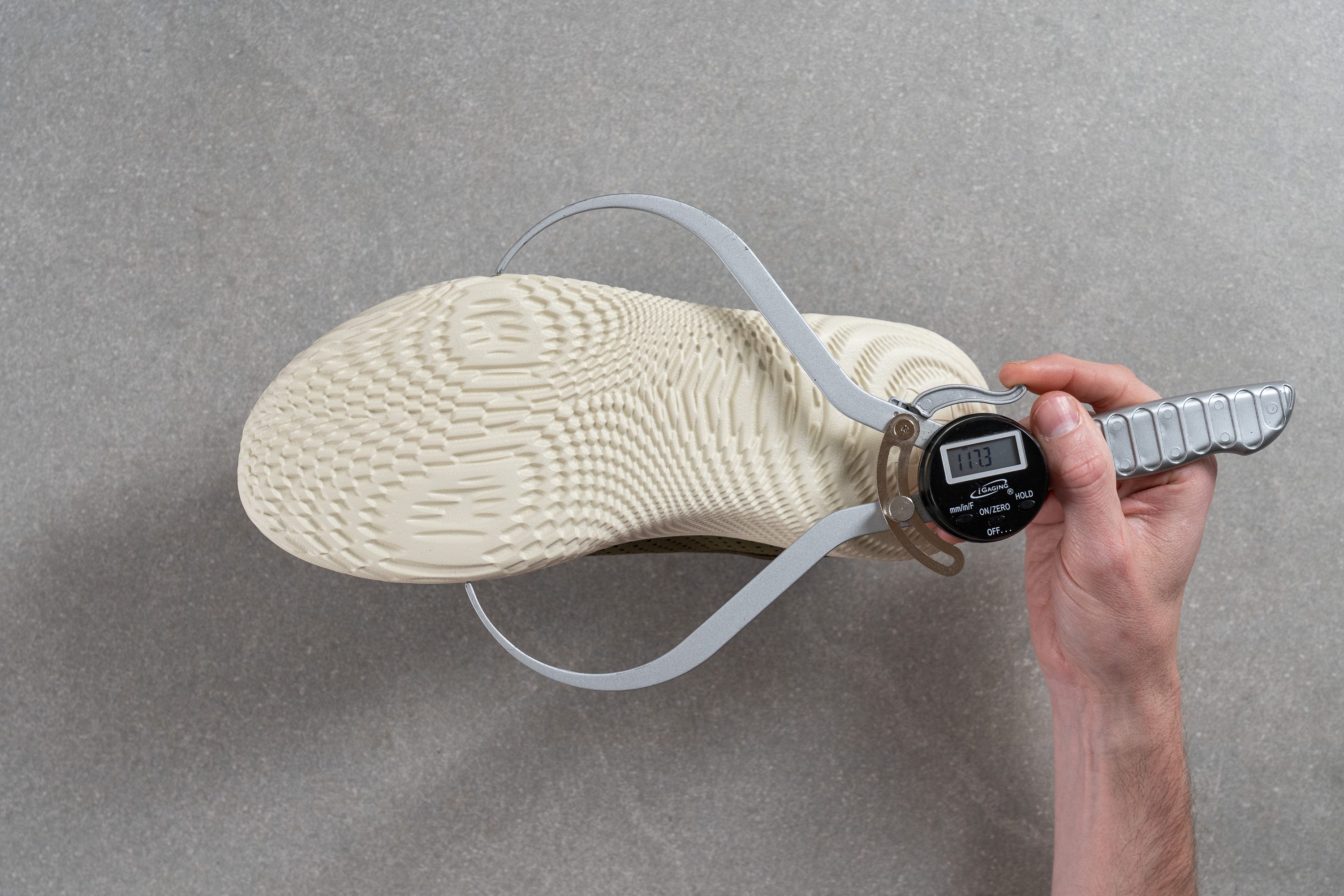
| SlipSpeed | 117.3 mm |
| Average | 110.9 mm |
Midsole width - heel
The SlipSpeed also turned out to be wider than average in the heel.
With a caliper reading of 93.9 mm, it is almost as wide as the Nike Metcon 9 (95.0 mm).
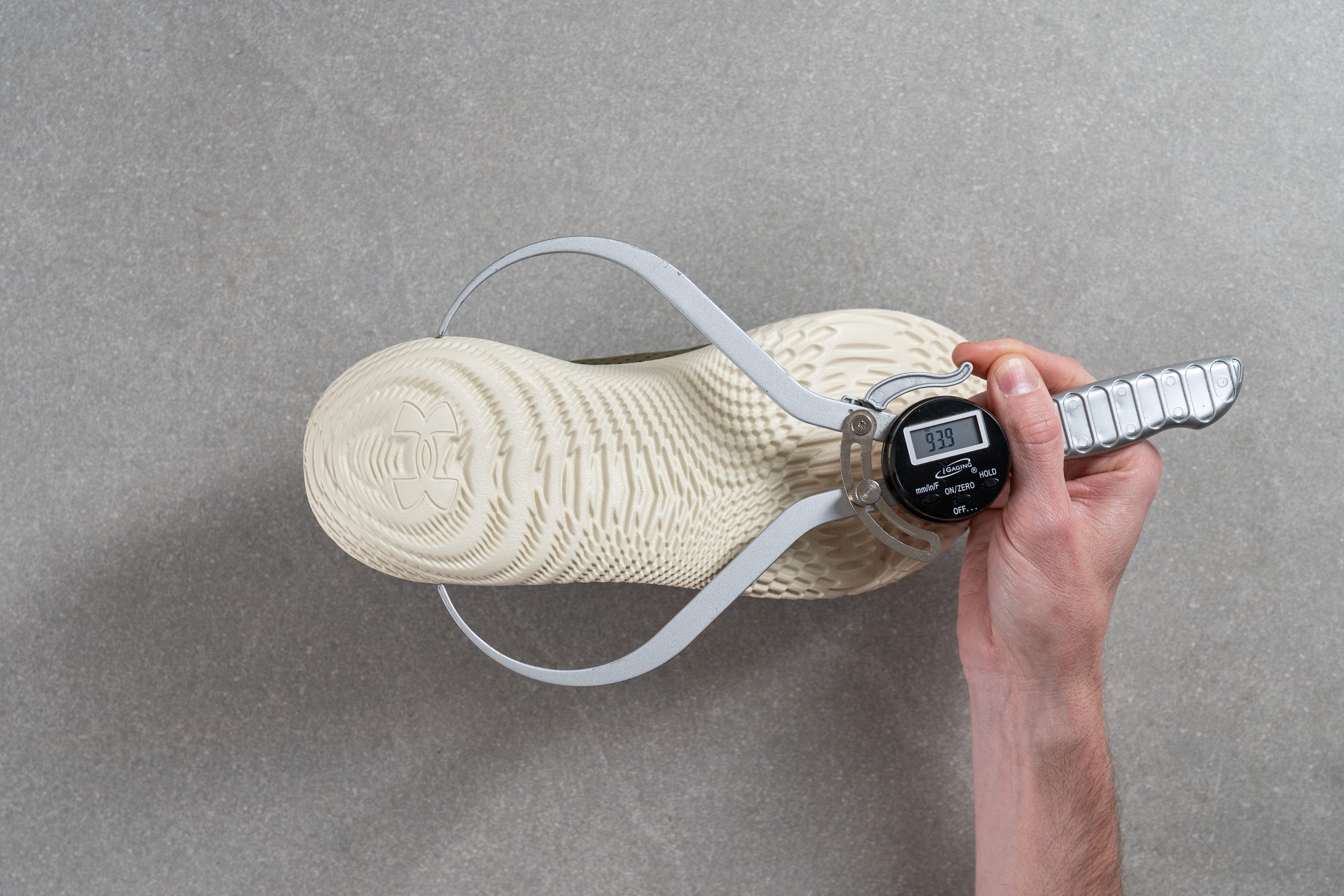
Having such a wide and flat base helped us feel surefooted when lifting and performing single-leg movements.
| SlipSpeed | 93.9 mm |
| Average | 86.9 mm |
Durability
Toebox durability
A mere glance at the shoe's sturdy upper promises durability.
After exposing the shoe's toebox material to our Dremel for 12 seconds, we saw a ridiculously minor scuff where most shoes develop a large hole!
Rating its toebox durability on a 1-5 scale, we confidently gave it the highest score of 5!
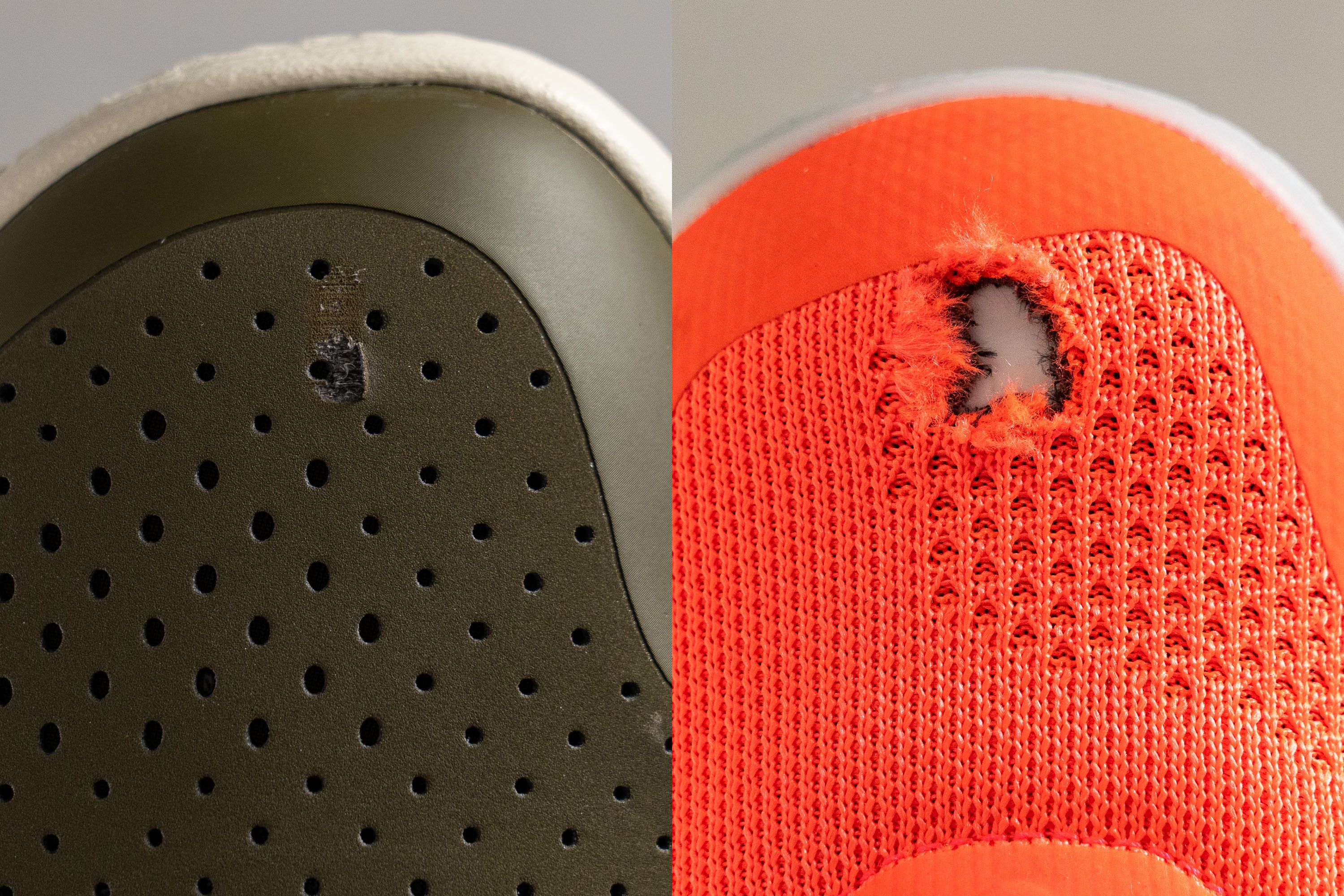
This reinforced material can handle a lot more wear and tear than a typical training shoe. Slashing it against the floor or gym equipment won't be an issue at all.
The only potential problem with the SlipSpeed's upper is that it tends to crease and chip off more than other uppers. It doesn't affect the shoe's integrity or durability but takes some points away from the looks.
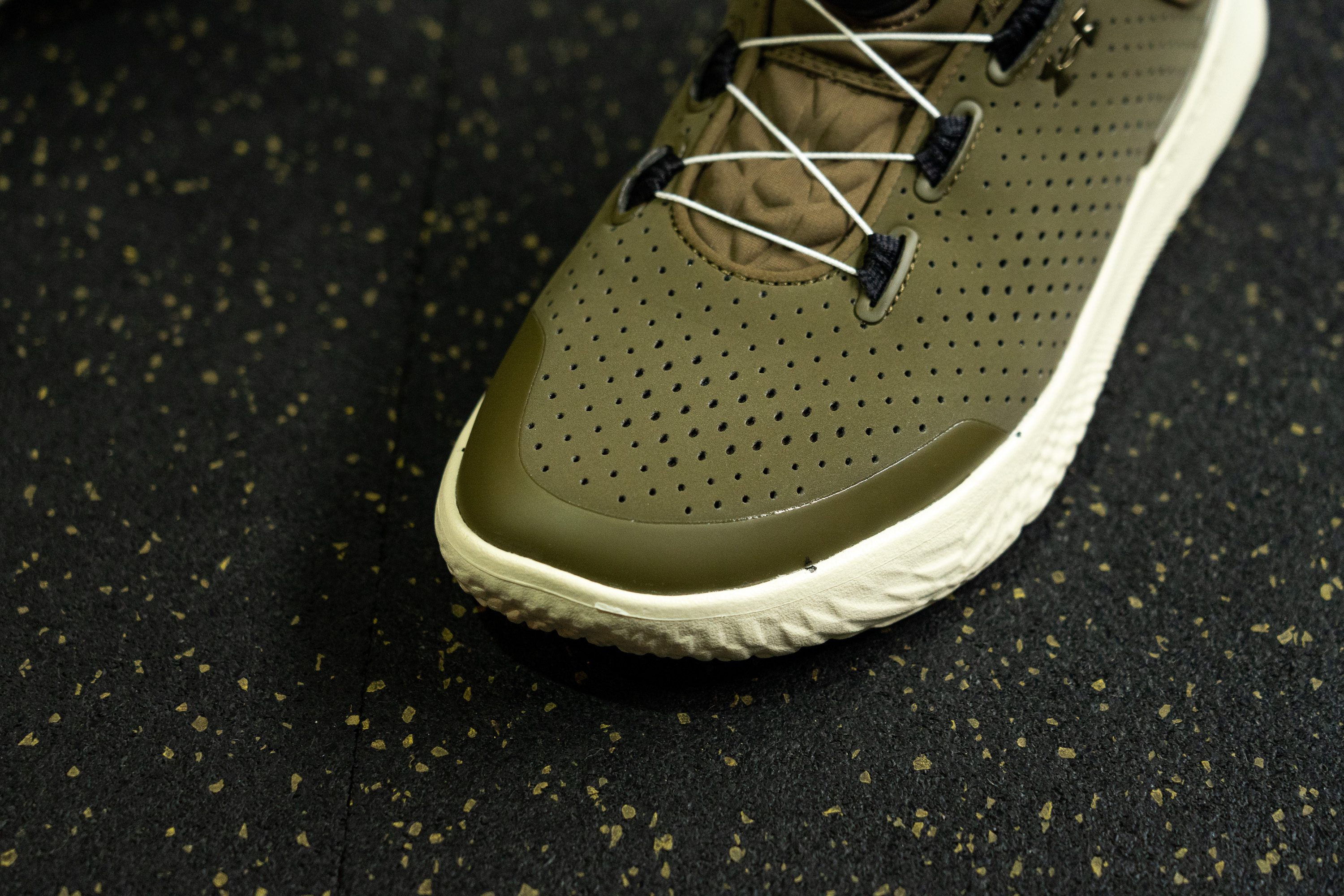
Under Armour is quick to call these shortcomings "battle scars" because they only appear if the wearer has been training "hard enough." That's one very market-y way to put it.
| SlipSpeed | 5 |
| Average | 2.7 |
Heel padding durability
Because the convertible heel collar is the shoe's main highlight, we had high expectations for this part of the SlipSpeed. Especially when it comes to wear resistance.
Luckily, the brand chose a rather durable textile for the inner lining of the heel counter. Given how much back-and-forth folding and sliding it is meant to withstand, we are happy with its performance in our durability test.
Coming in contact with our Dremel for 4 seconds, the fabric showed very small signs of wear. This earned the shoe's heel lining a solid durability score - 4 out of 5!
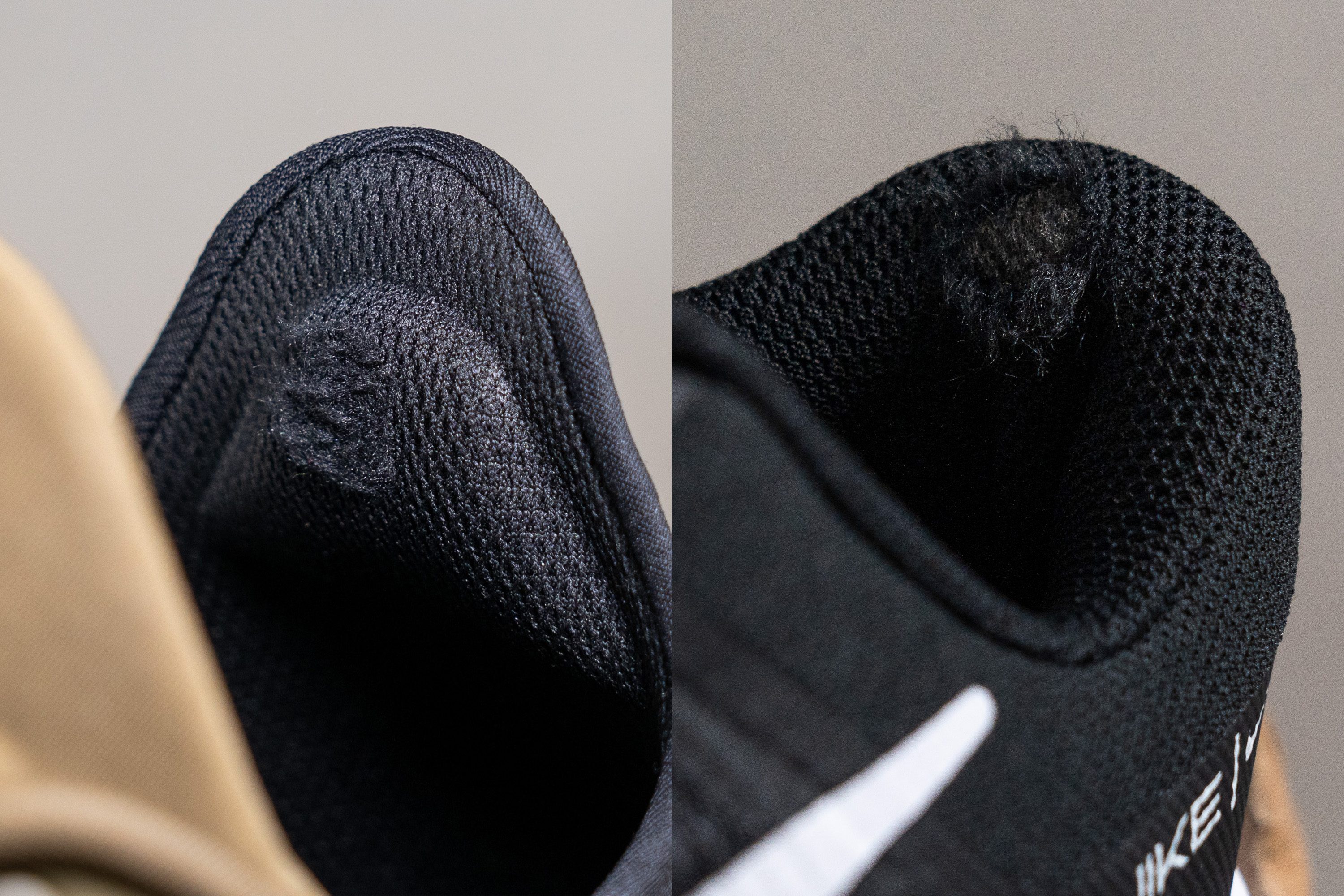
| SlipSpeed | 4 |
| Average | 2.9 |
Outsole hardness
The absence of a rubber outsole left us puzzled, to be honest. If the SlipSpeed is meant as a versatile knock-around, then why did Under Armour leave its foam exposed to wear and tear?
And it's not a firm type of foam either. Pressing our durometer against it showed 57.5 HC which is a whopping 45% softer than the average of training shoes! That's not very good news for the shoe's long-term durability.
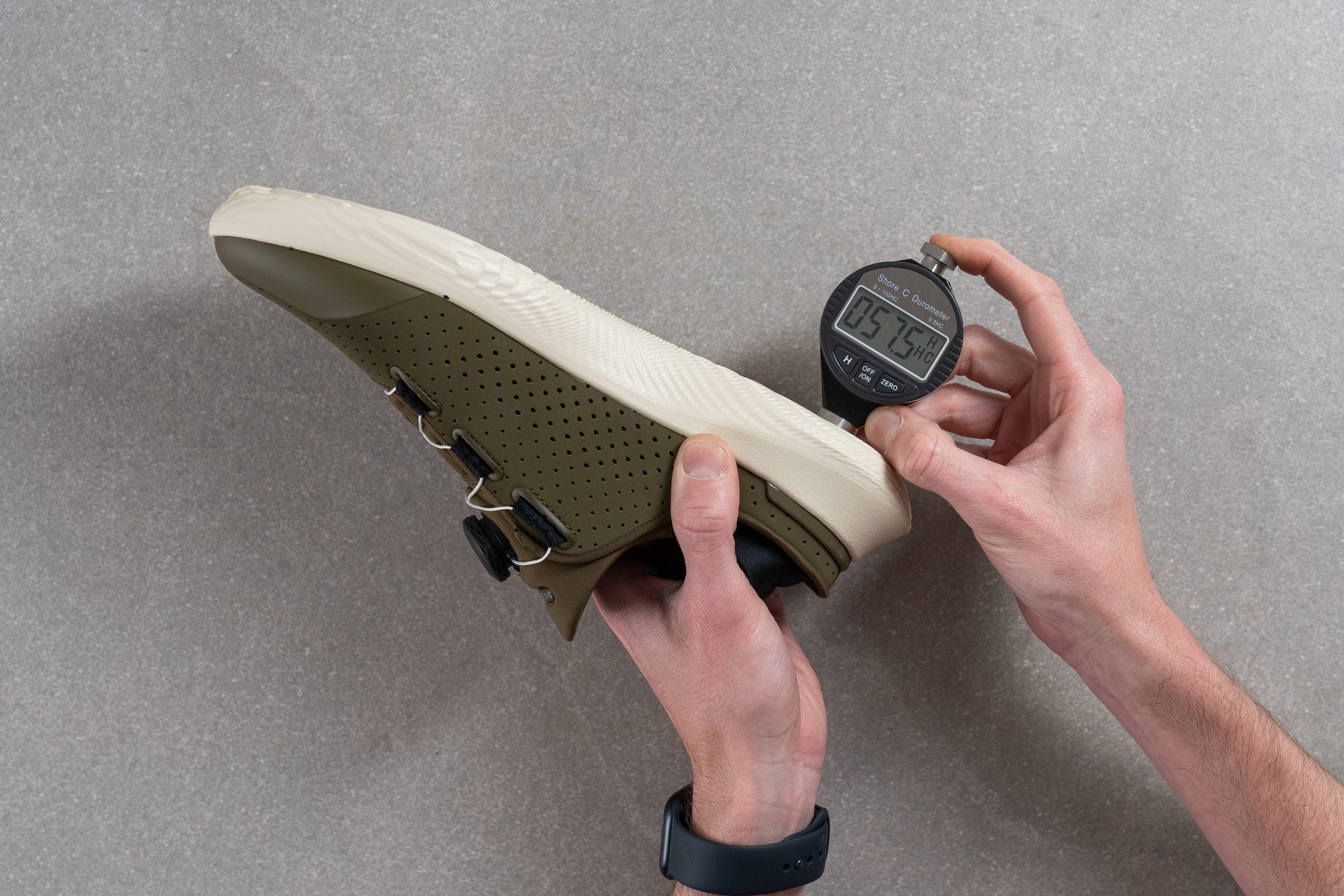
| SlipSpeed | 57.5 HC |
| Average | 83.2 HC |
Outsole durability
Looks like concrete, asphalt, and other abrasive surfaces are not good friends with this UA trainer.
Meeting the sandpaper tip of our Dremel for 22 seconds, the shoe's foam was eaten alive. The tool burnt a hole as deep as 4.7 mm! That's over 3 mm deeper than average!
| SlipSpeed | 4.7 mm |
| Average | 1.1 mm |
Outsole thickness
Unfortunately, we cannot recommend the Under Armour SlipSpeed for prolonged outdoor use, especially on highly abrasive surfaces.
But if your most common areas of habitat are home, car, coffee shop, and gym, then this shoe will serve you well.
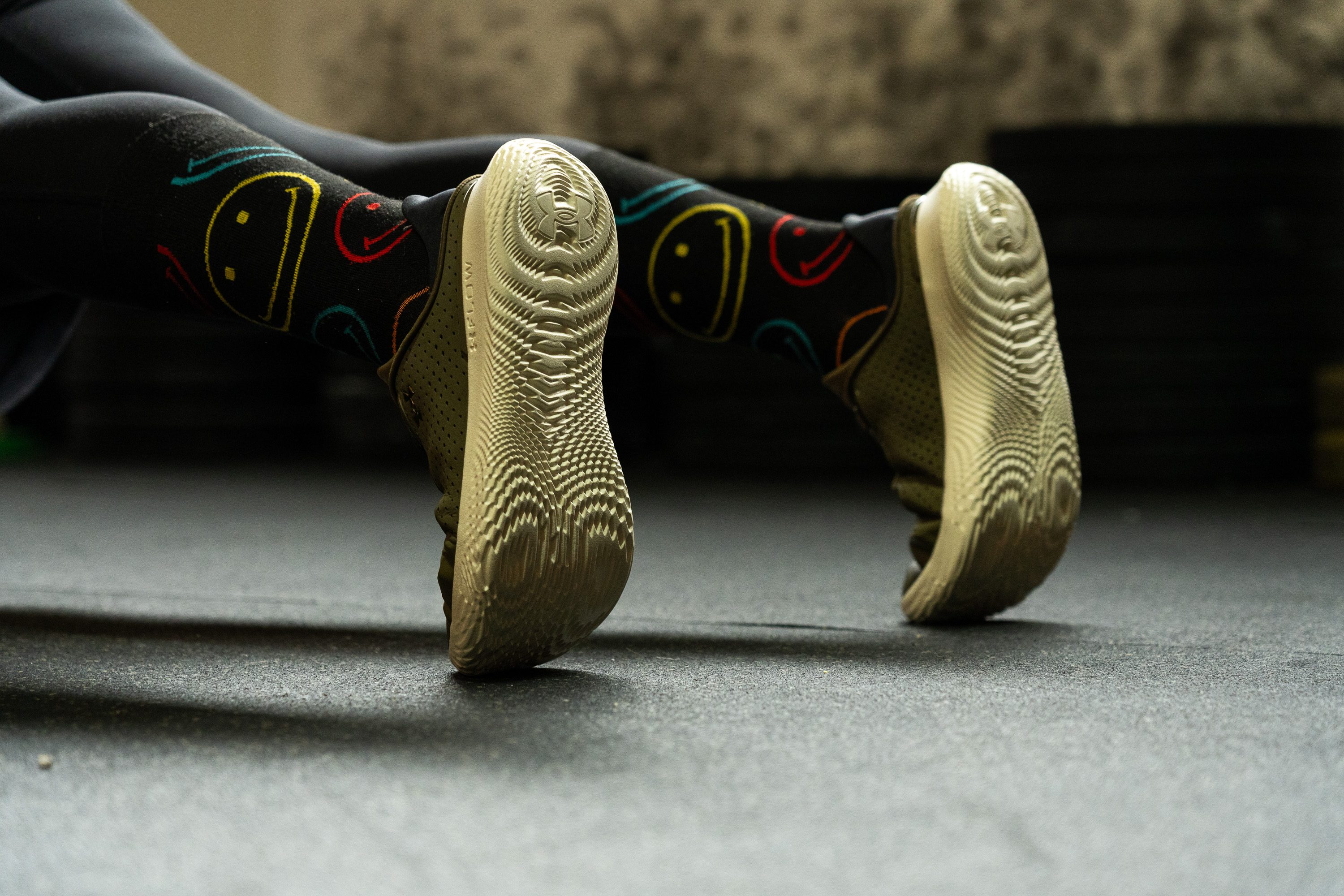
| SlipSpeed | 0.0 mm |
| Average | 3.6 mm |
Misc
Insole thickness
A generously padded insole makes the shoe even more comfortable for short runs, plyometrics, and long hours on the feet.
Based on our caliper measurement, it is thicker than average at 4.8 mm.
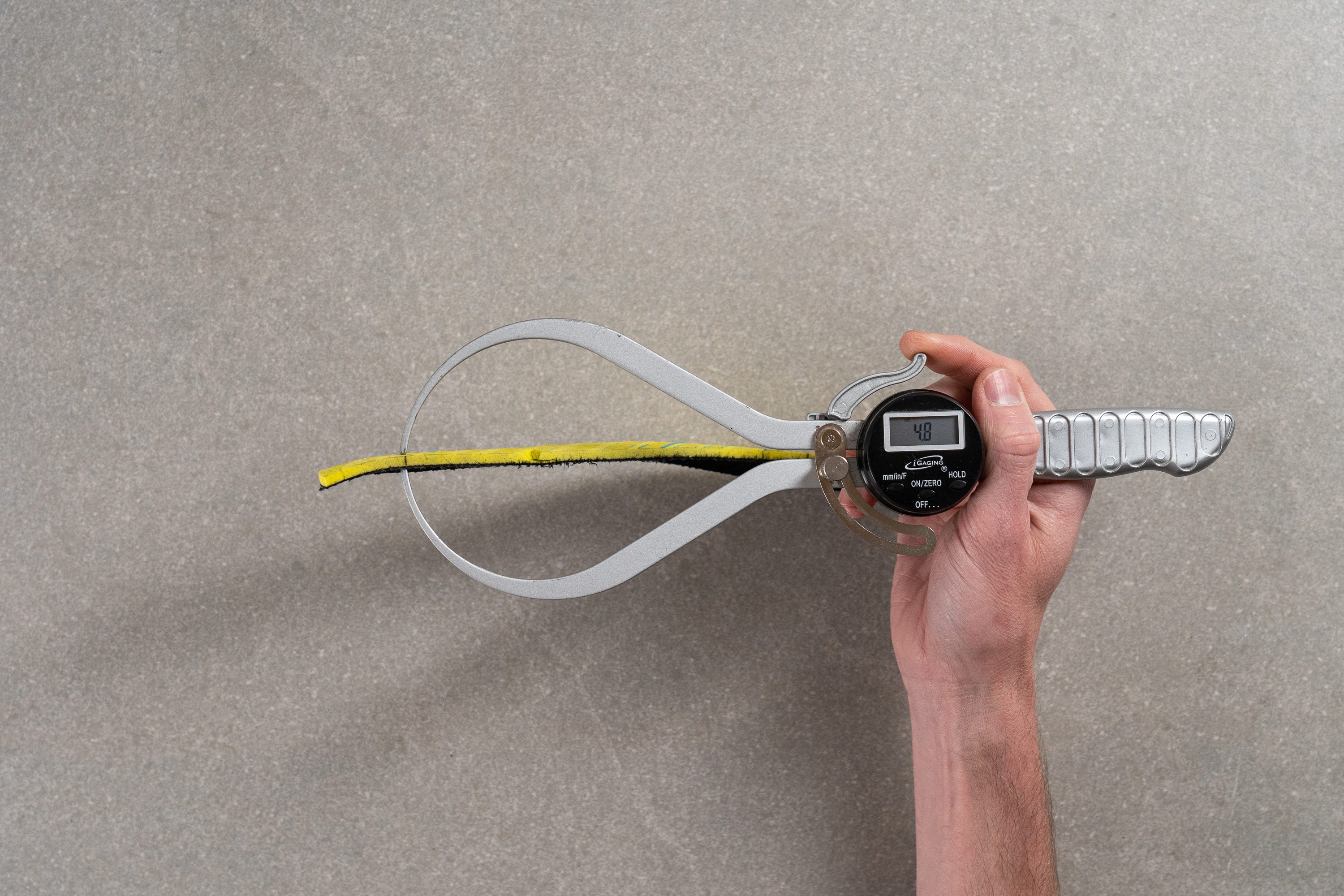
| SlipSpeed | 4.8 mm |
| Average | 4.0 mm |
Removable insole
Because the shoe's insole is removable you can play around by replacing it with a custom orthotic to elevate the in-shoe comfort.
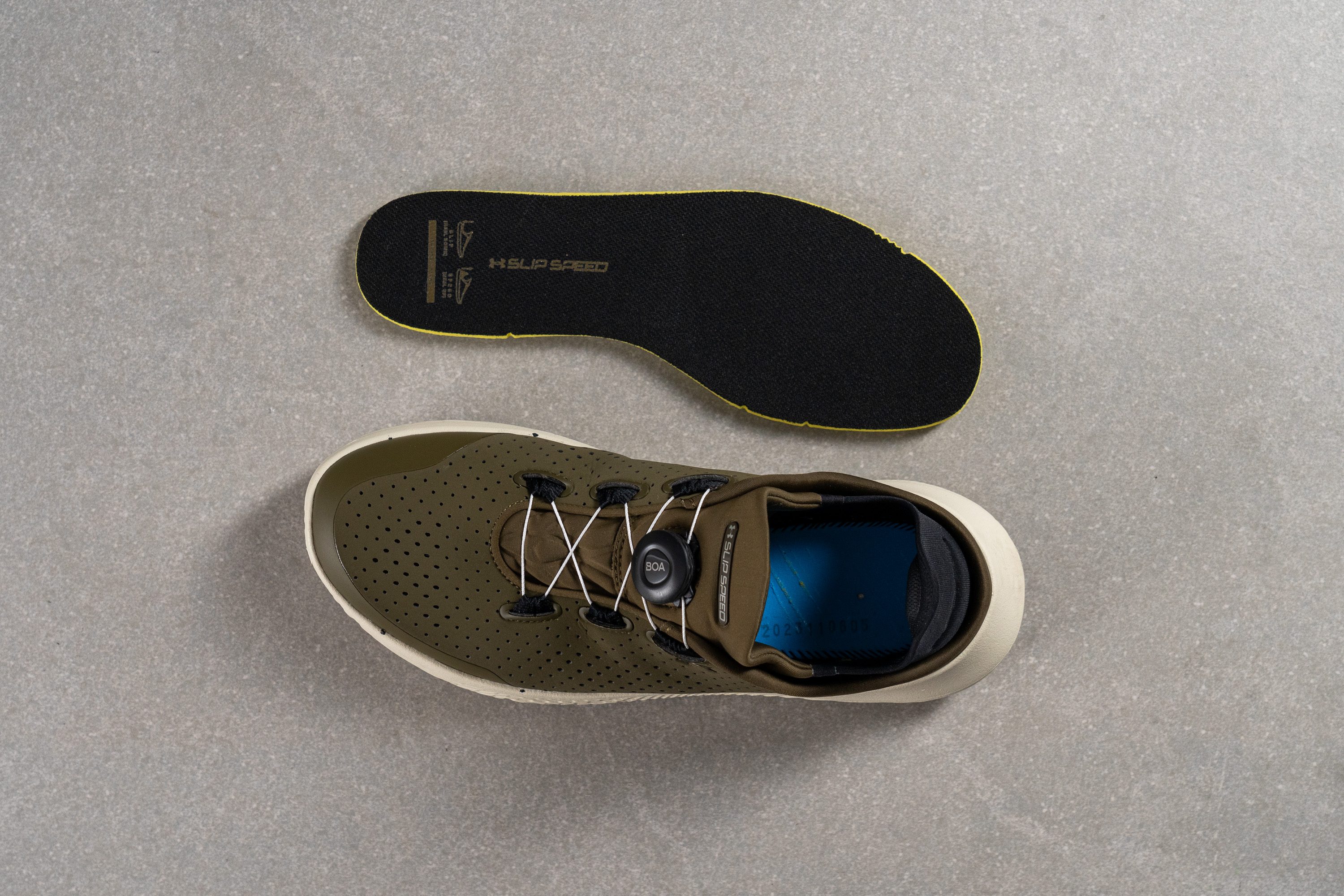
| SlipSpeed | Yes |
Reflective elements
There are no reflective elements on the UA SlipSpeed.
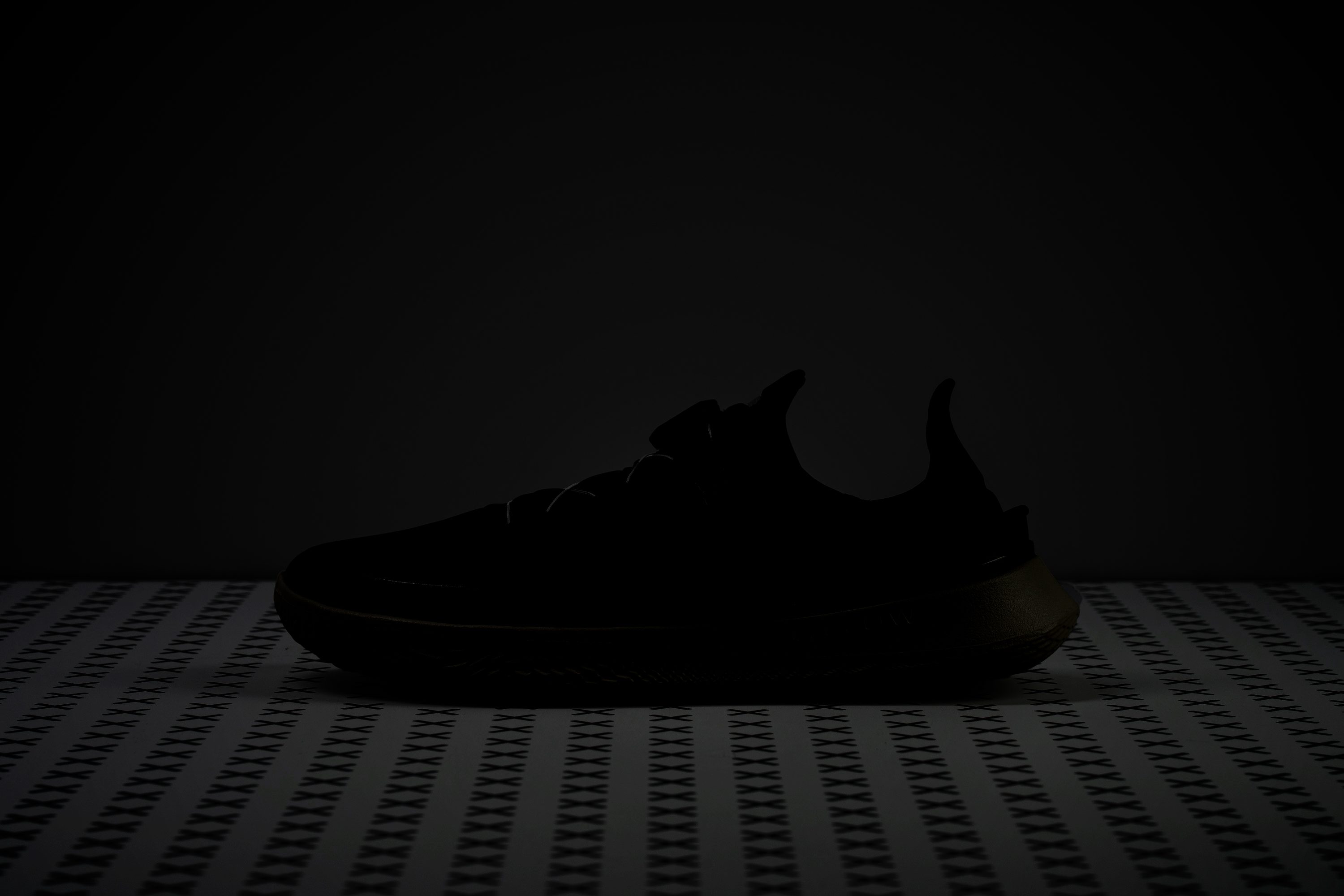
| SlipSpeed | No |
Tongue padding
The "tongue" (or the instep padding) of the SlipSpeed is not very thick. Showing only 4.4 mm on our caliper, it is a bit thinner than average.
But we found it to be just right to buffer the pressure from the BOA cables.
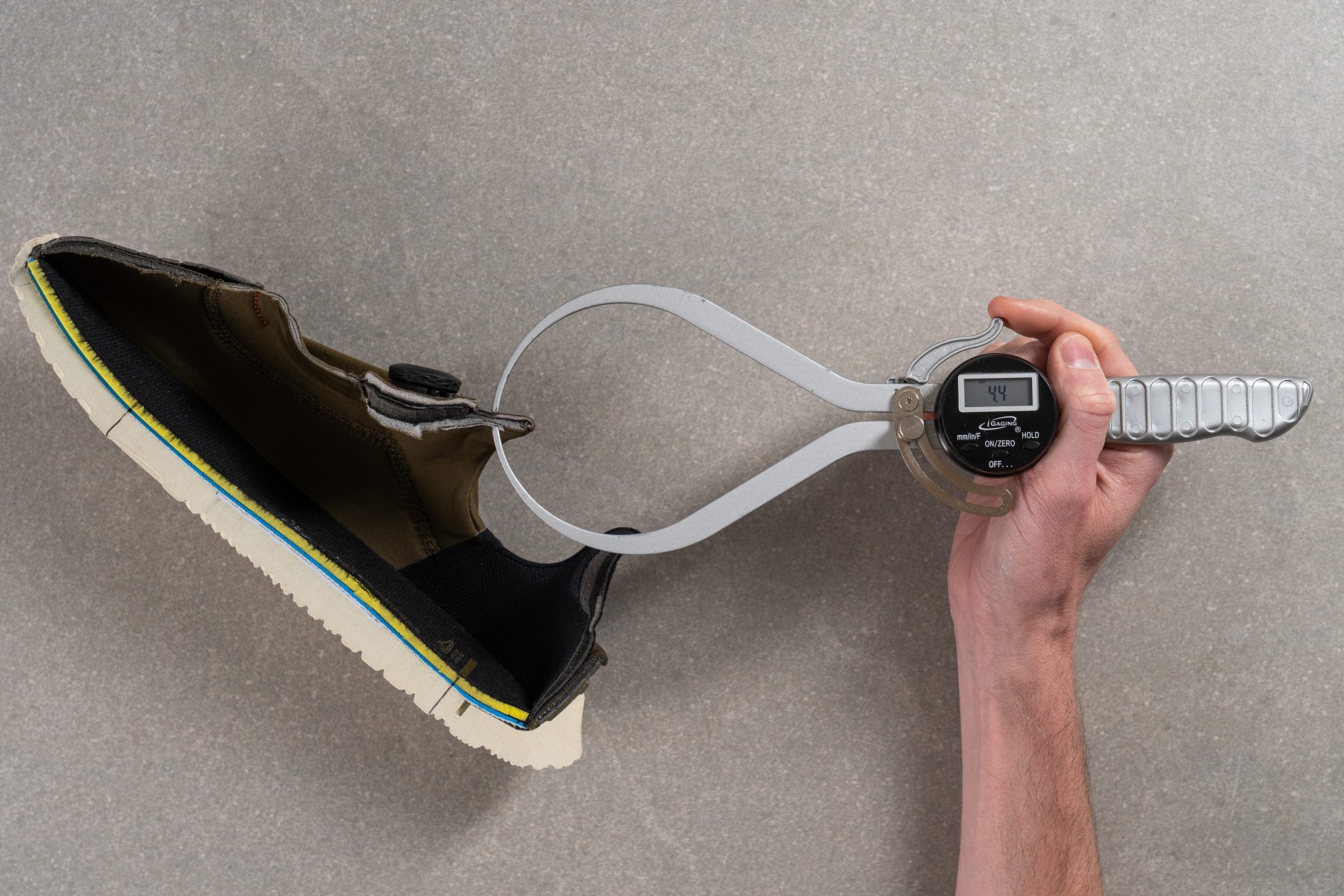
| SlipSpeed | 4.4 mm |
| Average | 5.7 mm |
Tongue: gusset type
As a mule, the Under Armour SlipSpeed features a one-piece bootie upper that wraps around the foot with no gaps in between.
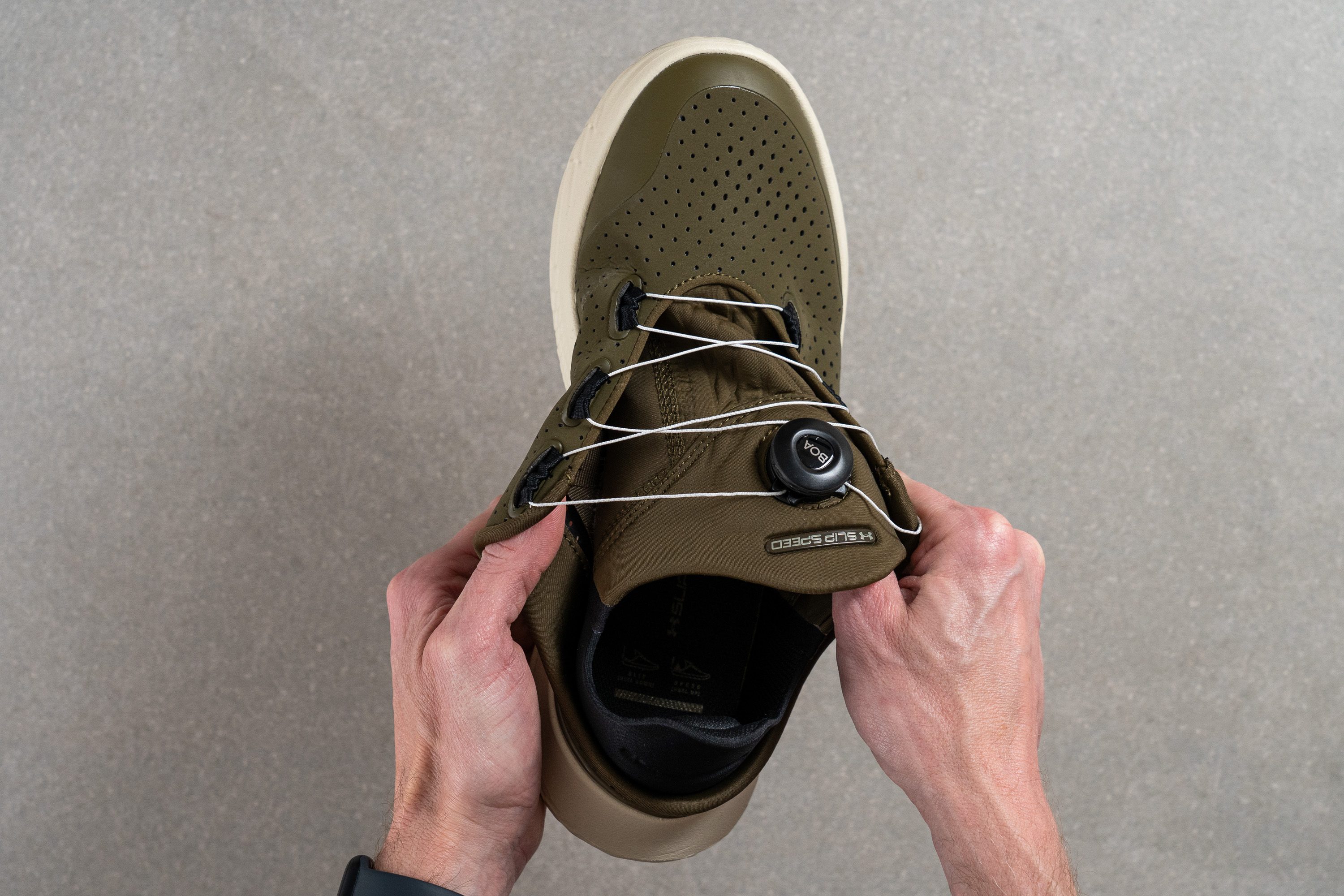
| SlipSpeed | Bootie |
Slip-on
With convenience as its cornerstone, the SlipSpeed features a foldable heel collar that quickly turns the shoe into a slipper. You don't even need hands to push the collar down!
Switching gears from training to rest couldn't be any easier!
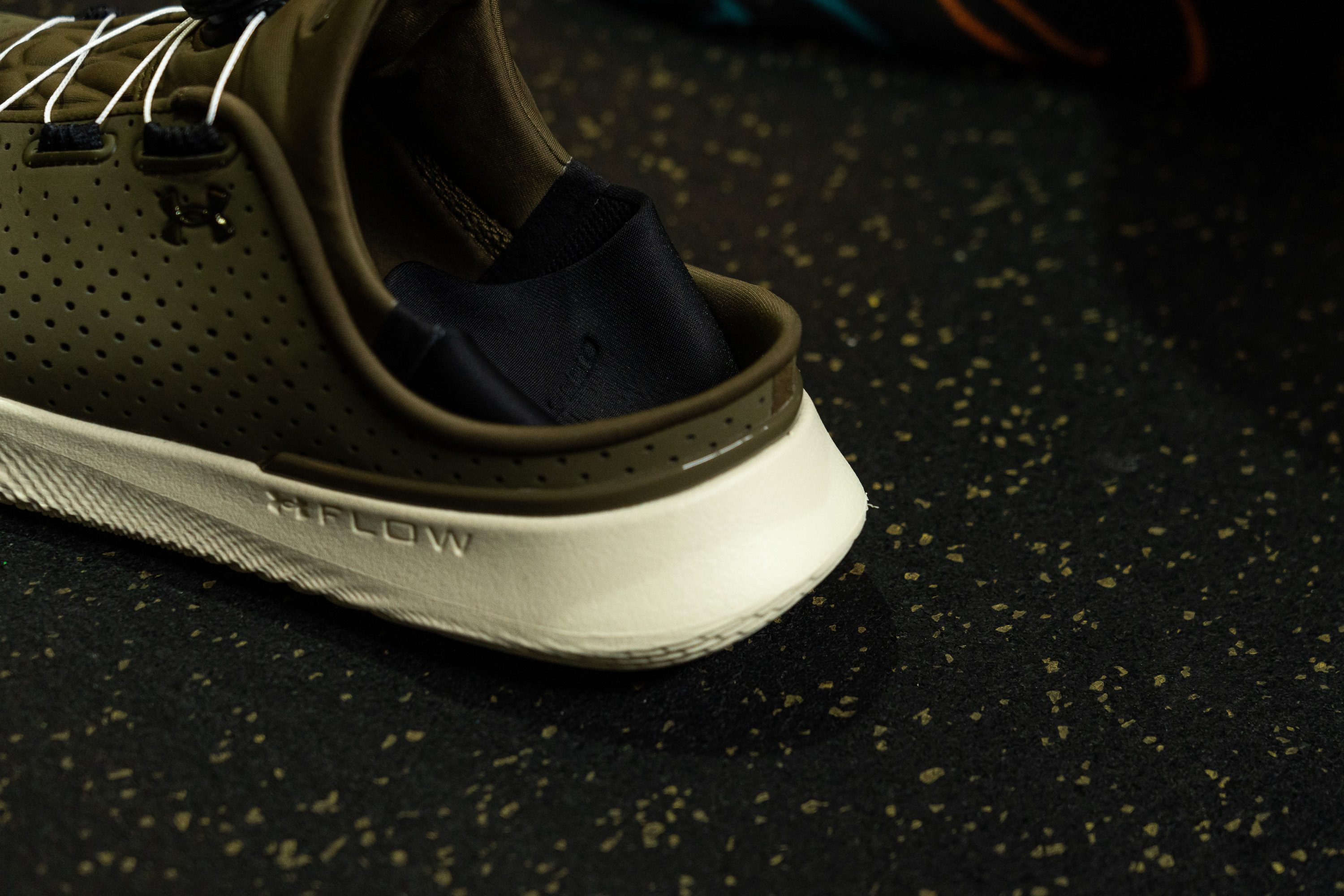
We found that there is a small pillow on the inner side of the foldable part. It works as the Achilles pad when the collar is up but turns into a heel crash pad when you fold the collar.
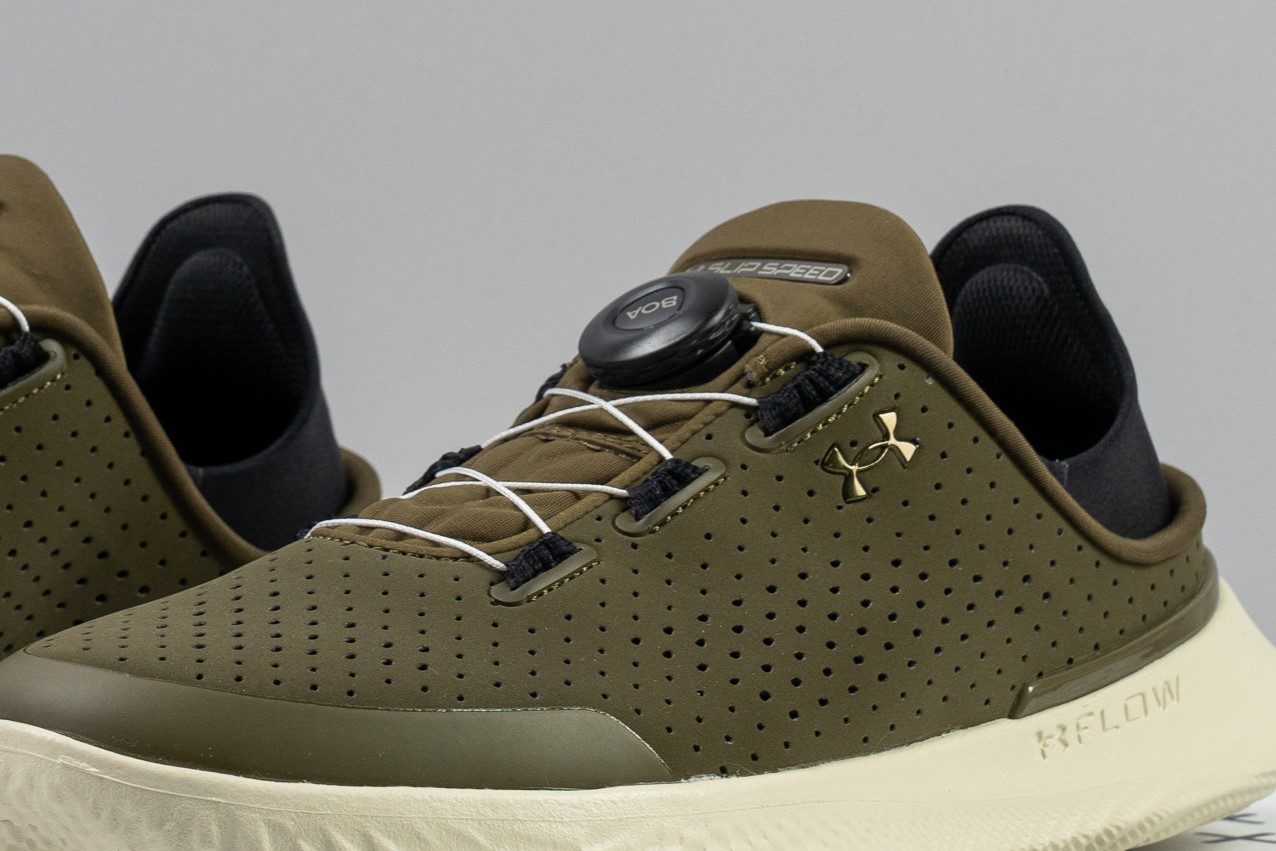
But here is the caveat: if you have sensitive feet and prefer the bottoms of your shoes to be as smooth as the baby's bottom, you might be annoyed with the folded material beneath the heel.
Machine washable
To make the SlipSpeed even more enticing, Under Armour promotes it as machine washable. It is promised to last up to 200 wash cycles before starting to lose integrity.
Just follow these simple rules:
- Place the shoes in a laundry bag (it may or may not come with the shoe depending on the retailer you buy it from)
- Machine wash on cold delicate
- Allow shoes to air-dry (tumble drying is not recommended as it can heat up the glue and the foam)
